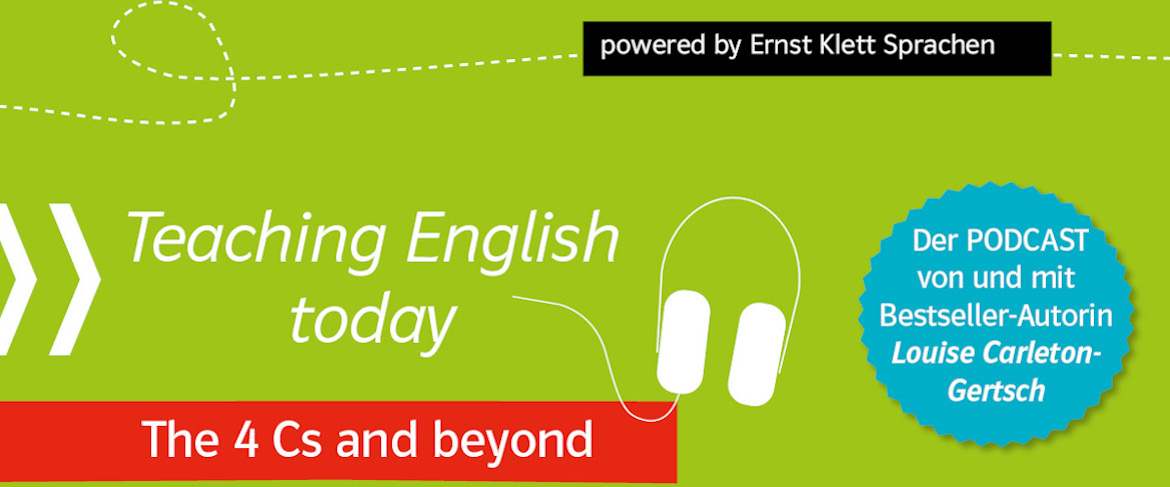
Podcast
We've all heard of the 4 Cs – collaboration, creativity, critical thinking, communication –, but what if there were other key skills and qualities? What about the power of curiosity, the value of empathy and the need for grit? Join me – and my guests – as we delve into these core skills in this podcast series and work out just what their importance is for students of English today.
You can listen to the episodes on my website, at Ernst Klett Sprachen and on the following platforms:
Do get in touch – I'd love to hear your thoughts.

Episode 46
Are we born with a particular mindset, or can we shape the way we think over time? In this episode, we'll explore the key differences between fixed and growth mindsets, debunk some of the most common myths about the latter, uncover how we can go about changing our thinking patterns, and discuss practical strategies for helping students (and ourselves) develop a more resilient approach to learning and life.
Here are the sources for Episode 46.
Book: Dweck, Carol S. Mindset - The New Psychology of Success. New York: Ballantine Books, 2007.
Book: Dweck, Carol S. Mindset. Changing the way you think to fulfil your potential. (Revised edition). London: Robinson, 2017
Website: Stanford University | Teaching Commons, "Growth mindset and enhanced learning." Last accessed 28.10.2025.
Article: Dweck, Carol S. "What having a 'Growth Mindset' actually means." Harvard Business Review, 13 January 2016. Last accessed 28.10.2025.
TED talk: Dweck, Carol S. "The power of believing that you can improve." TEDxNorrkoping, December 2014. Last accessed 28.10.2025.
Article: Dweck, Carol S. "Growth Mindset: where did it go wrong." Times Educational Supplement, 11 April 2020. Last accessed 28.10.2025.
Article: Haimovitz, Kyla, Yeager, David. "A Playbook for Growth Mindset." Medium, 15 December 2021. Last accessed 28.10.2025.
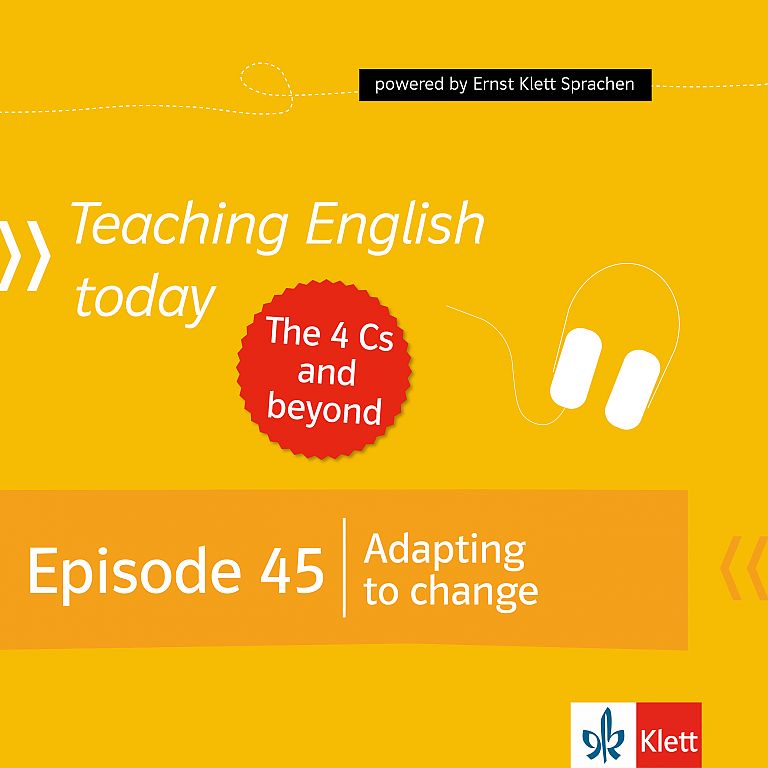
Episode 45
Today, organisations are increasingly looking for adaptable and resilient employees who are able to navigate uncertainty and change. In this episode we'll be looking at the similarities and differences between adaptability and resilience, which other skills and competencies are linked to them, the characteristics and behaviours of stress-resilient leaders and the importance of psychological safety for both. Listen in to also find out what we can do to foster this in the English-speaking classroom.
Here are the sources for Episode 45.
Article: Brassey, J., De Smet, A., Maor, D. "Developing a resilient, adaptable workforce for an uncertain future." McKinsey Quarterly, 6 December 2024. Last accessed 27.10.2025.
Website: American Psychogical Association. "Psychological topics. Resilience." Last accessed 27.10.2025.
Website: American Psychogical Association. "APA Dictionary of Psychology. Adaptability." Last accessed 27.10.2025.
Article: Epstein, Sophia. "How adaptability helps you 'bounce forwards' at work." BBC, 20 September 2022. Last accessed 17.05.2025.
Book: Dweck, Carol S. Mindset. Changing the way you think to fulfil your potential. (Revised edition). London: Robinson, 2017.
Article: Wiens, Kandi. "5 Characteristics of Stress-Resilient People (and How to Develop Them)." Harvard Business Review, 15 April 2024. Last accessed 27.10.2025.
Book: Robinson, Ken, Robinson, Kate. Imagine if ... Creating a future for us all. London: Penguin, 2022.
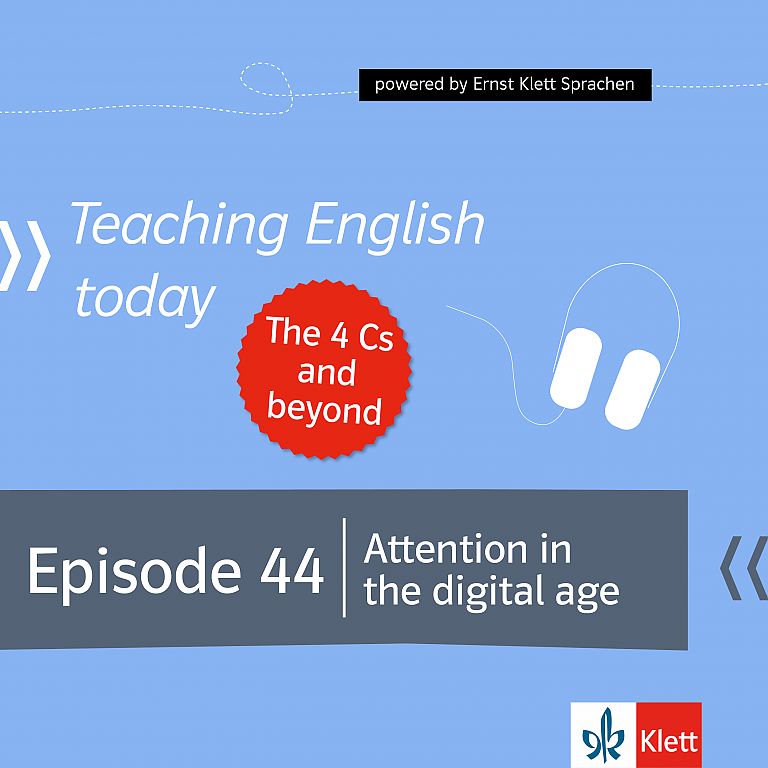
Episode 44
Do you suffer from brain rot? Why are our attention spans shrinking - to what extent does digital technology play a role? In this episode we'll be looking at different forms of attention, some practical ways we can regain control, as well as a few ideas for students.
Here are the sources for Episode 44.
Press release: "'Brain rot' named Oxford Word of the Year 2024." Oxford University Press website, 2 December 2024. Last accessed 27.10.2025.
Book: Mark, Glora. Attention Span: A Groundbreaking Way to Restore Balance, Happiness, and Productivity. London: William Collins, 2023.
Talk: Mark, Gloria. The Science of Our Attention Spans with Professor Gloria Mark. University of Cambridge ThinkLab, 30 January 2023. Last accessed 27.10.2025.
Podcast: Speaking of Psychology Episode 225 "Speaking of Psychology: Why our attention spans are shrinking, with Gloria Mark, PhD." American Psychological Association, February 2023. Last accessed 27.10.2025.
Article: Rothwell, Jonathan. "Teens Spend Average of 4.8 Hours on Social Media Per Day." Gallup website, 13 October 2023. Last accessed 27.10.2025.
Paper: Wang, Yiran et al. (2015, March 14-18). "Coming of Age (Digitally): An Ecological View of Social Media Use among College Students." CSCW '15, Vancouver, BC, Canada. Last accessed 27.10.2025.
Article: Knight, Rebecca. "7 Habits to Stay Focused in a World [Full] of Distractions." Harvard Business Review, 4 February 2025. Last accessed 27.10.2025.
Article: Dube, Rebecca. "Worried about teens and phones? 21 helpful things parents can say and do" Today, 26 September 2023. Last accessed 27.10.2025.
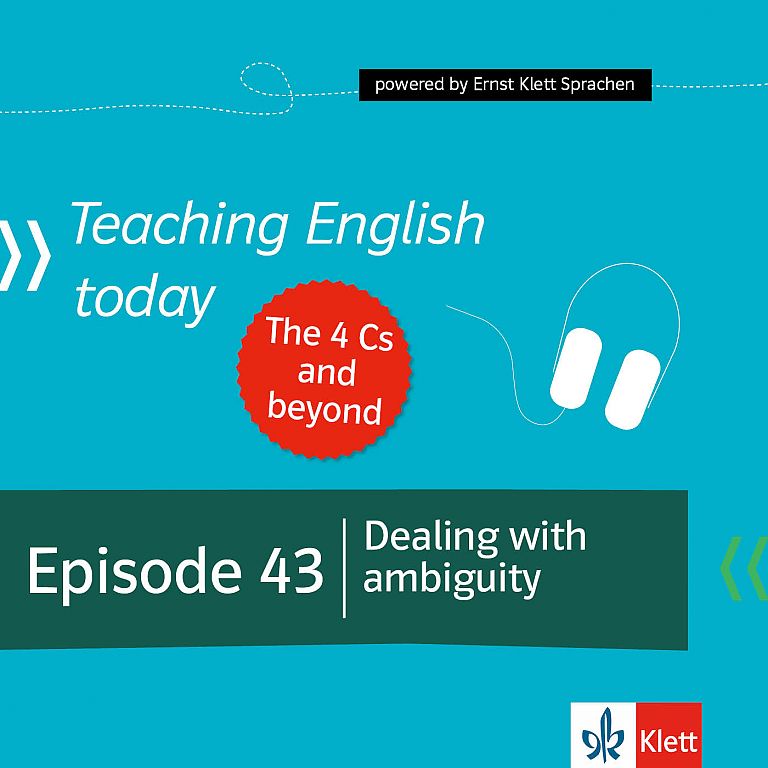
Episode 43
Tolerance for ambiguity is a crucial skill for navigating the complexities and uncertainties of the modern world, as well as being key for innovation. In this episode we'll be looking at different ways people deal with ambiguity, how we can develop our tolerance for it, and some practical ideas for how it can be fostered in the English-speaking classroom.
Here are the sources for Episode 43.
Book: De Brabandere, Luc & Iny, Alan. Thinking in New Boxes. A New Paradigm for Business Creativity. New York: Random House, 2013.
Article: Pahuja, Sandeep, Kogan, Alice. "4 Strategies to Chart a Path Forward When There is No Map." UX Magazine, 2 May 2020. Last accessed 26.10.2025.
Article: Skaggs, Paul. "Tolerance for ambiguity." Industrial Designers Society of America (IDSA) website, September 2022. Last accessed 26.10.2025.
Report: "State of the Global Workplace." Gallup, 2025. Last accessed 26.10.2025.
Article: Kowal Smith, Ann. "Why dealing with ambiguity is the skill we desperately need." Forbes Magazine, 18 June 2024. Last accessed 26.10.2025.
Book: Small, Andrea & Schmutte, Kelly. Navigating Ambiguity: Creating Opportunity in a World of Unknowns. Berkeley: Ten Speed Press, 2022.
Publication: "Transformative Competencies for 2030." OECD, 2019. Last accessed 26.10.2025.
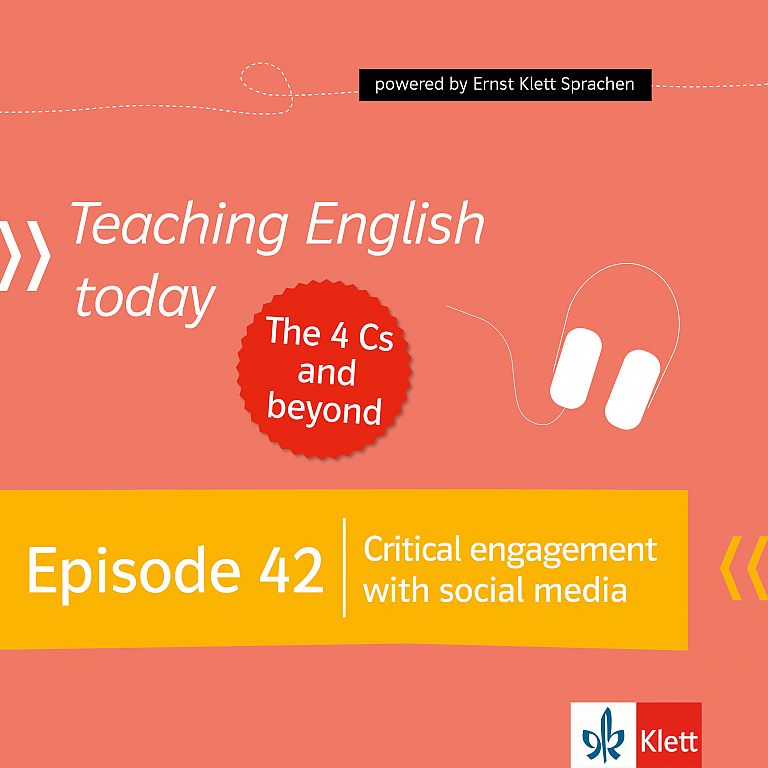
Episode 42
Attention has become a valuable commodity, especially on social media platforms that use sophisticated algorithms designed to keep us hooked. In this episode we'll be looking at why this is especially challenging for young people, whether all screen time is created equal, and what we can do in the classroom to help students think more critically about how they use social media.
Here are the sources for Episode 42.
Article: Murthy, Vivek H. "Surgeon General: Why I'm Calling for a Warning Label on Social Media Platforms." New York Times, 17 June 2024. Last accessed 26.10.2025.
Report: "Potential risks of content, features, and functions. A closer look at the science behind how social media affects youth." American Psychological Association, April 2024. Last accessed 26.10.2025.
Report: "Ohne Ende Online." DAK Gesundheit & Deutsches Zentrum für Suchtfragen
des Kindes- und Jugendalters, UK Hamburg-Eppendorf, March 2025. Last accessed 26.10.2025.
Article: Prothero, Arianna. "How Social Media May Benefit Teens' Mental Health." Education Week, 16 February 2024. Last accessed 26.10.2025.
Study: Medienpädagogischer Forschungsverbund Südwest (MPFS). JIM-Studie 2024. Last accessed 26.10.2025.
Handbook: Digital Citizenship Education Handbook. Council of Europe, 2019. Last accessed 26.10.2025.
Article: Schulten, Katherine. "Teenagers and Misinformation: Some Starting Points for Teaching Media Literacy." New York Times, 20 October 2022. Last accessed 26.10.2025.
Article: Suciu, Peter. "Social Media Literacy Still Lacking – Could That Change?" Forbes Magazine, 9 February 2025. Last accessed 26.10.2025.

Episode 41
Today, the climate crisis is fundamentally reshaping the planet. And it is the younger and future generations that will bear the brunt of this. In this episode we will be looking at how we need to help young people develop a global mindset as well as agency - in its different modes - to be able to face the challenges ahead.
Here are the sources for Episode 41.
Publication: "Education for Sustainable Development – a roadmap. ESD for 2030." United Nations Educational, Scientific and Cultural Organization, 2020. Last accessed 17.5.2025.
Article: Schleicher, Andreas "Educating for the 21st Century." The Big Think, 14 April 2014. Last accessed 20.5.2025.
Website: United Nations "Global citizenship." Last accessed 20.5.2025.
Article: Seary, Kate. "Global identity: The mindset for climate success." UNICEF Innocenti – Global Office of Research and Foresight website, 6 December 2023. Last accessed 20.5.2025.
Article: Carlin, Scott, Choi, YuKang. "The Role of Civil Society in Advancing Global Citizenship." UN Chronicle, 18 January 2018. Last accessed 20.5.2025.
Website: Albert Bandura. Last accessed 20.5.2025.
Report: Leadbeater, Charles. "Learning on purpose: Ten lessons in placing student agency at the heart of schools." Centre for Strategic Education, Victoria, February 2022. Last accessed 20.5.2025.
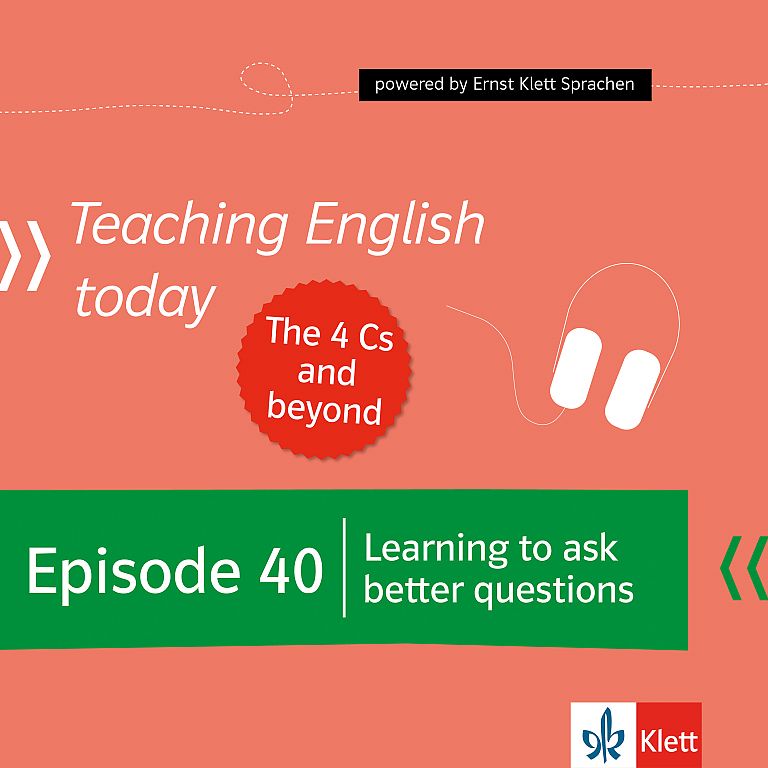
Episode 40
Most of us don't ask enough questions, good questions. This is not only central for effective communication but also critical and creative thinking. In this episode we'll be looking at different types of questions, how we can learn to ask better questions, and importantly, what can be done to further this in the classroom. Listen in to find out more!
Here are the sources for Episode 40.
Article: Huang, K., Yeomans, M., Brooks, A. W., Minson, J., Gino, F. "It Doesn't Hurt to Ask: Question-asking Increases Liking." Journal of Personality and Social Pschology, September 2017. Last accessed 17.5.2025.
Article: Brooks, A.W., John, L. K. "The surprising power of questions." Harvard Business Review Magazine, May-June 2018. Last accessed 17.5.2025.
Article: Coleman, John. "Critical Thinking Is About Asking Better Questions." Harvard Business Review, 22 April 2022. Last accessed 17.5.2025.
Website: IDEO. Last accessed 17.5.2025.
Book: Covey, Stephen R. The 7 Habits of Highly Effective People. London: Simon & Schuster, 2020.
Book: Derber, Charles. The Pursuit of Attention: Power and Ego in Everyday Life. Oxford: Oxford University Press, 2000.
Book: Murphy, Kate. You're not Listening. What You're Missing and Why it Matters. New York: Celadon Books, 2019.
Article: Pohlmann, Tom, Thomas, Neethi M. "Relearning the art of asking questions." Harvard Business Review, 27 March 2015. Last accessed 17.5.2025.
Book: Carnegie, Dale. How to win friends and influence people. London: Vermilion, 2006.
Speech: Ryan, James. "Commencement Speech." Cambridge (Massachusetts), 26 May 2016. Last accessed 17.5.2025.
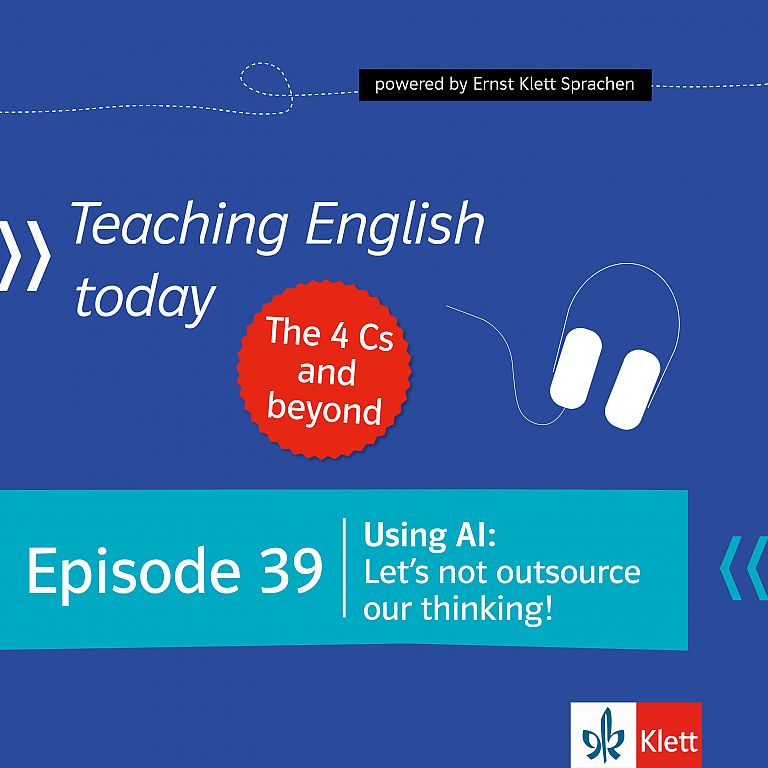
Episode 39
Whether at the BETT show or the International Day of Education, AI is a hot topic right now. It's no longer coming, it's here and changing how we teach and learn. Listen in to find out how we can help students navigate AI without losing their critical thinking skills or agency, why AI literacy and search literacy are essential, the importance of understanding how students use AI, as well as why we need to focus on the process not just the end product.
Here are the sources for Episode 39.
Speech: Azoulay, Audrey. Speech on the International Day of Education 2025. 20 January 2025. Last accessed 17.5.2025.
Study: Bitkom. "Bereits jede zweite Lehrkraft hat KI für die Schule genutzt." Press release 9 October 2024. Last accessed 17.5.2025.
Article: Wineburg, Sam. "Our democracy is at stake." Civic online reasoning website. Last accessed 17.5.2025.
Article: Wineburg, Sam, McGrew, Sarah. "Lateral Reading and the Nature of Expertise." Teachers College Record, 28 July 2018. Last accessed 17.5.2025.
Article: Wineburg, Sam, Ziv, Nadav. "What Makes Students (and the Rest of Us) Fall for AI Misinformation?" Education Week, 25 October 2024. Last accessed 17.5.2025.
Report: "Research brief: Teens, Trust, and Technology in the Age of AI" Common Sense, 29 January 2025. Last accessed 17.5.2025.
Survey: "Representation of BBC News content in AI Assistants. " BBC, 11 February 2025. Last accessed 17.5.2025.
Article: Grose, Jessica. "What Teachers Told Me About A.I. in School." New York Times, 14 August 2024. Last accessed 17.5.2025.
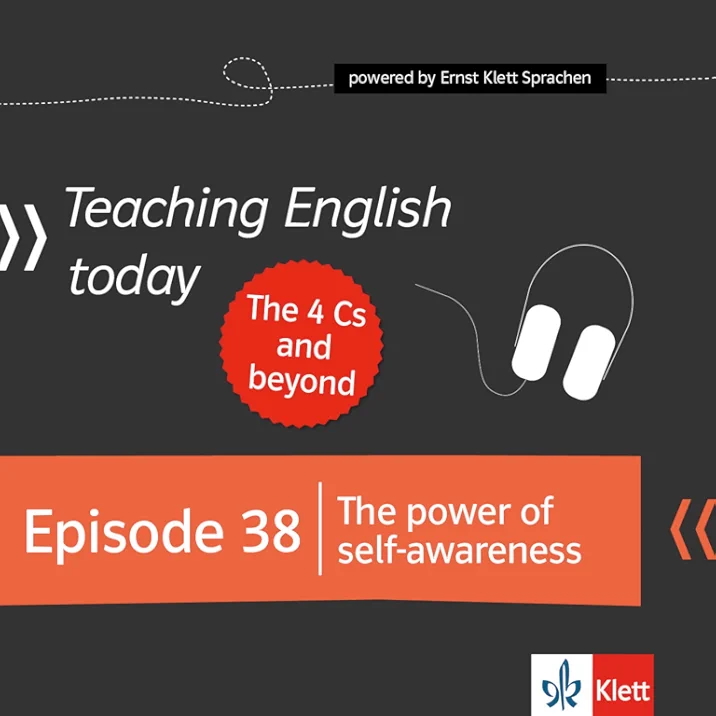
Episode 38
Self-awareness is a core component of emotional intelligence - yet most of us overestimate how self-aware we truly are. In this episode we'll explore what self-awareness is, how it affects us and our work, the importance of changing the questions we ask ourselves, and what students can do to improve their self-awareness to influence their learning outcomes.
Here are the sources for Episode 38.
Book: Eurich, Tasha, Insight: Why We're Not as Self-Aware as We Think, and How Seeing Ourselves Clearly Helps Us Succeed at Work and in Life. Sydney: Currency, 2017.
Article: Eurich, Tasha. "Working with People Who Aren't Self-Aware." Harvard Business Review, 19 October 2018. Last accessed 17.05.2025.
Article: Avolio, Bruce J., Gardner, William L. "Authentic leadership development: Getting to the root of positive forms of leadership." The Leadership Quarterly, volume 16/3 June 2005. Last accessed 17.05.2025.
Article: Goleman, Daniel. "What makes a leader?" Harvard Business Review Magazine, January 2004. Last accessed 17.5.2025.
Article: Dierforff, Erich C., Rubin, Robert S. "Research: We're Not Very Self-Aware, Especially at Work." Harvard Business Review, 12 March 2015. Last accessed 17.5.2025.
Article: Eurich, Tasha. "What Self-Awareness Really Is (and How to Cultivate It)." Harvard Business Review, 4 January 2018. Last accessed 17.5.2025.
Video: Robinson, Sir Ken. "Flourishing." RSA Shorts, July 2013. Last accessed 17.5.2025.
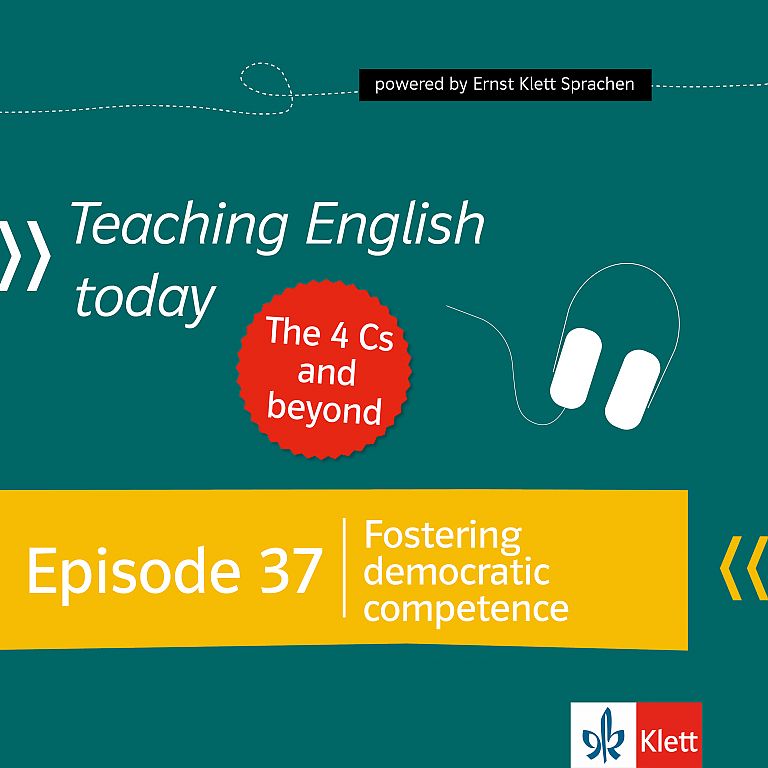
Episode 37
Many people view voting as fundamental to being a good citizen, yet voter turnout is on the decline. In this episode, we'll be exploring the concept of democratic competence, focusing on the key values, attitudes, skills, and knowledge necessary for its development. We will also be looking at practical ideas and activities for fostering this vital competence in the classroom.
Here are the sources for Episode 37.
Report: Foa, R.S., Klassen, A., Slade, M., Rand, A. and R. Collins. "Global Satisfaction with Democracy 2020." Bennett Institute for Public Policy at the University of Cambridge. Last accessed 17.5.2025.
Report: Wike, Richard, Silver, Laura, Clancy, Laura. "What Makes Someone a Good Member of Society?" , Pew Research Center, 16 November 2022. Last accessed 17.5.2025.
Report: Wike, Richard, Fetterolf, Janell "Satisfaction with democracy has declined in recent years in high-income nations." Pew Research Center, 18 June 2024. Last accessed 17.5.2025.
Publication: Brower, Tracy. "Competences for Democratic Culture." Council of Europe, 5 December 2021. Last accessed 17.5.2025.
Website: Council of Europe. "Reference Framework of Competences for Democractic Culture". Last accessed 17.5.2025.
Article: Harding, Martha. "3 Ways to Get Comfortable with Ambiguity." IDEO, April 2018. Last accessed 17.5.2025.
Website: The Civic Trust. "National Civics Bee. Essay Guide 2024 to 2025." Last accessed 17.5.2025.
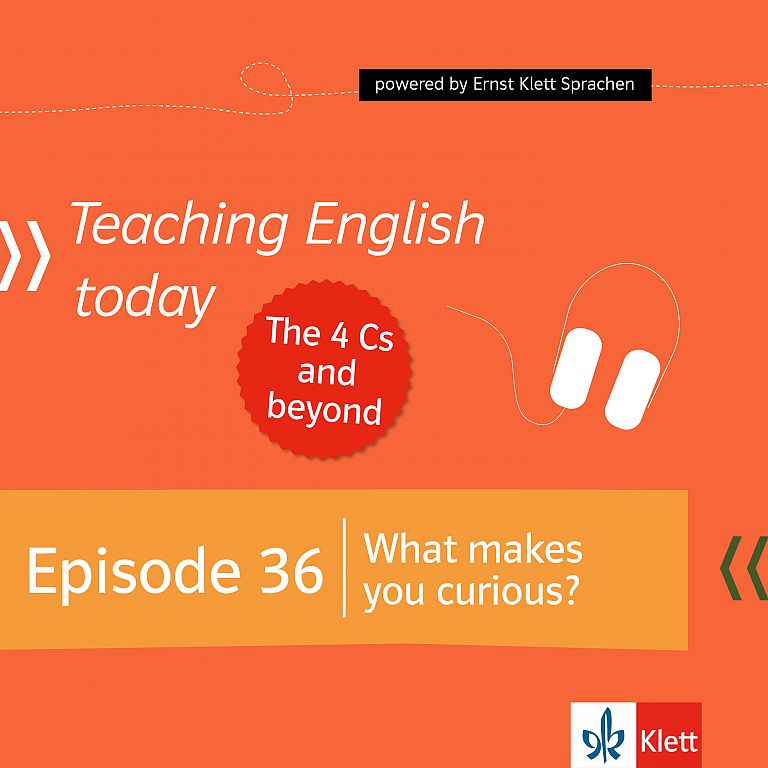
Episode 36
Have you heard of the five dimensions of curiosity? Do you know what its benefits are? Are you interested in finding out what can be done to promote it in the classroom? Come and join me to find out more!
Here are the sources for Episode 36:
Article: Kashdan, Todd B., Disabato, David J., Goodman, Fallon R., McKnight, Patrick E. "The Five-Dimensional Curiosity Scale Revised." Personality and Individual Differences, volume 157, 15 April 2020. Last accessed 17.5.25
Report: World Economic Forum. "Future of Jobs 2023." 1 May 2023. Last accessed 17.5.2025.
Article: Brower, Tracy. "Curiosity Is The Hot New Skill: 5 Ways To Set Yourself Apart In Your Job Search." Forbes Magazine, 5 December 2021. Last accessed 17.5.2025.
Book: Shigeoka, Scott. Seek. How Curiosity can Transform your Life and Change the World. New York: Balance, 2023.
Website: Todd B. Kashdan. Last accessed 17.5.2025.
Article: Jovanović, Veljko, Brdaric, Dragana. "Did curiosity kill the cat? Evidence from subjective well-being in adolescents." Personality and Individual Differences, volume 52, February 2012. Last accessed 17.5.2025.
Article: Kashdan, Todd B., Disabato, David J., Goodman, Fallon R., Naughton, Carl. "The Five Dimensions of Curiosity." Harvard Business Review Magazine, September-October 2018. Last accessed 17.5.2025.
Article: Gino, Francesca. "The Business Case for Curiosity." Harvard Business Review Magazine, September-October 2018. Last accessed 17.5.2025.
Article: Benjamin, David, Komlos, David. "Has Your Organization Stopped Asking Questions?" Forbes Magazine, 26 September 2022. Last accessed 17.5.2025.
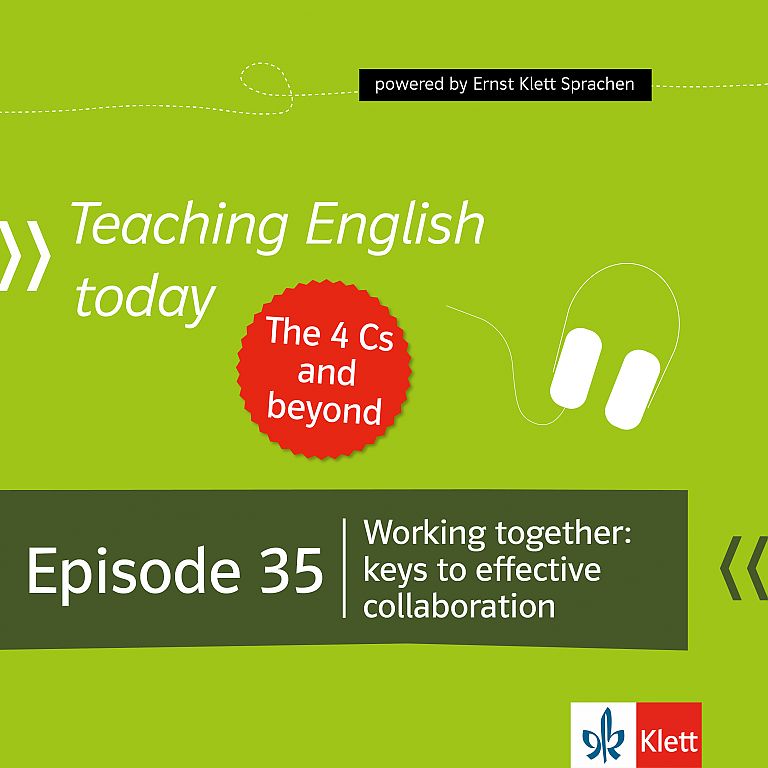
Episode 35
Today, working in teams is the norm. But why is it that some teams click, and others don't? What lies at the core of effective collaboration? In this episode we'll be looking at two key components that come up in studies time and again. We'll also be exploring how we can help students to become more effective at working together.
Here are the sources for Episode 35:
Article: LeStage, Gregory, Nilsson DeHanas, Sara, Gerend, Pete and Narula, Ineet. "At the Top, It's All about Teamwork." Bain & Company website, July 2023. Last accessed 17.5.2025.
Book: Edmondsen, Amy. The Fearless Organisation. Hoboken: John Wiley, 2018.
Article: Gallo, Amy. "What is psychological safety?" Harvard Business Review, 15 February 2023. Last accessed 17.5.2025.
Article: Gallo, Amy. "Teamwork on the fly." Harvard Business Review Magazine, April 2012. Last accessed 17.5.2025.
Book: Salmons, Janet. Learning to collaborate, collaborating to learn. New York: Routledge, 2023.
Article: Duhigg, Charles. "What Google Learned From Its Quest to Build the Perfect Team." New York Times Magazine, 25 February 2016. Last accessed 17.5.2025.
Article: Scott, Elizabeth. "Conflict Resolution Skills and Strategies for Healthy Relationships." Very Well Mind, updated 15 June 2022. Last accessed 17.5.2025.
Blog post: "Workplace Woes: Meetings Edition." Atlassian website. 2023. Last accessed 17.5.2025.
Article: Phillips, Jennifer. "How to run effective virtual and in-person meetings." Slack, updated 3 April 2025. Last accessed 17.5.2025.
TED talk: Edmondsen, Amy. "How to turn a group of strangers into a team." TED salon, October 2017. Last accessed 17.5.2025.
Book: Greenberg, Sarah Stein. Creative Acts for Curious People. How to Think, Create, and Lead in Unconventional Ways. California: Ten Speed Press, 2021.
Article: MacGregor, Jeff. "Meet Lin-Manuel Miranda, the Genius Behind "Hamilton," Broadway's Newest Hit." Smithsonian Magazine, 12 November 2015. Last accessed 17.5.2025.

Episode 34
As the new school year begins, it's the perfect time to think about how 21st century skills can be integrated into the classroom. In this episode, I'll be sharing practical ideas on how to do so, including ways to support student agency, strategies for effective communication when giving and receiving feedback, and a few activities to practise noticing - a prerequisite for creativity and critical thinking. I'll also be looking at how we can help students to engage their critical thinking skills when dealing with photos on social media.
Here are the sources for Episode 34:
Research project: Ford Australia, Deakin University, Griffith University. "100 Jobs of the Future." Last accessed 10.8.2024.
Blog post: Godin, Seth. "Student coach." 12 July 2024. Last accessed 10.8.2024.
Book: Greenberg, Sarah Stein. Creative Acts for Curious People. How to Think, Create, and Lead in Unconventional Ways. California: Ten Speed Press, 2021.
Book: Walker, Rob. The Art of Noticing. New York: Alfred A. Knopf, 2021.
Website: News Literacy Project. Last accessed 10.8.2024.
Article: Menczer, Filippo & Hills, Thomas. "Information Overload Helps Fake News Spread, and Social Media Knows It." Scientific American, 9 December 2020. Last accessed 10.8.2024.
Online resource: "What's going on in this picture?" The New York Times. Last accessed 10.8.2024.
Book: Harari, Yuval Noah. 21 Lessons for the 21st Century. New York: Spiegel & Grau, 2018.
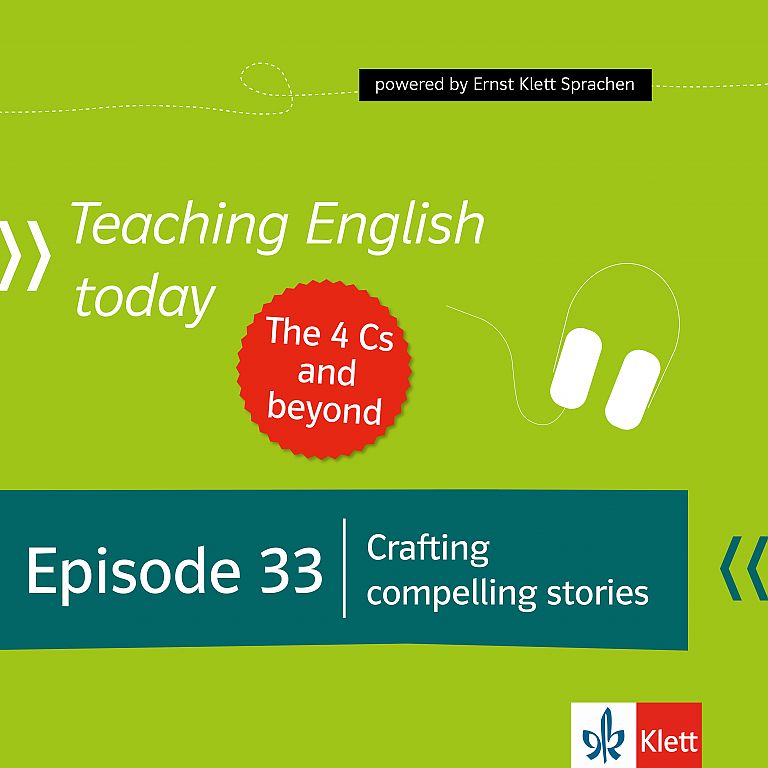
Episode 33
Creativity and innovation are key components of design thinking, a human-centered approach to creatively solving problems. In this episode we'll be looking at what exactly design thinking is, the phases involved in the design thinking process, the kind of mindset people need, and how this creative process can be supported and used in the classroom.
Here are the sources for Episode 33.
Book: Jiwa, Bernadette. What Great Storytellers Know. Seven Skills to Become Your Most Influential and Inspiring Self. Vancouver: Page Two Books, 2020.
Book: Haidt, Jonathan. The Righteous Mind. Why Good People are Divided by Politics and Religion. London: Penguin, 2013.
Article: Anderson, Chris. "Storytelling is a powerful communication tool - here's how to use it", TED website, 11 November 2019. Last accessed 11.8.2024.
Book: Simmons, Annette. Whoever Tells the Best Story Wins. New York: Amacom, 2023.
Podcast: HBR IdeaCast Episode 840 "The positives - and perils - of storytelling." Harvard Business Review, 8 February 2022. Last accessed 11.8.2024.
Article: Duarte, Nancy. "How to Identify and Tell Your Most Powerful Stories.", Harvard Business Review, 11 November 2018. Last accessed 11.8.2024.
Book: McKee, Robert. Story: Substance, Structure, Style, and the Principles of Screenwriting. New York: Regan Books, 1997.
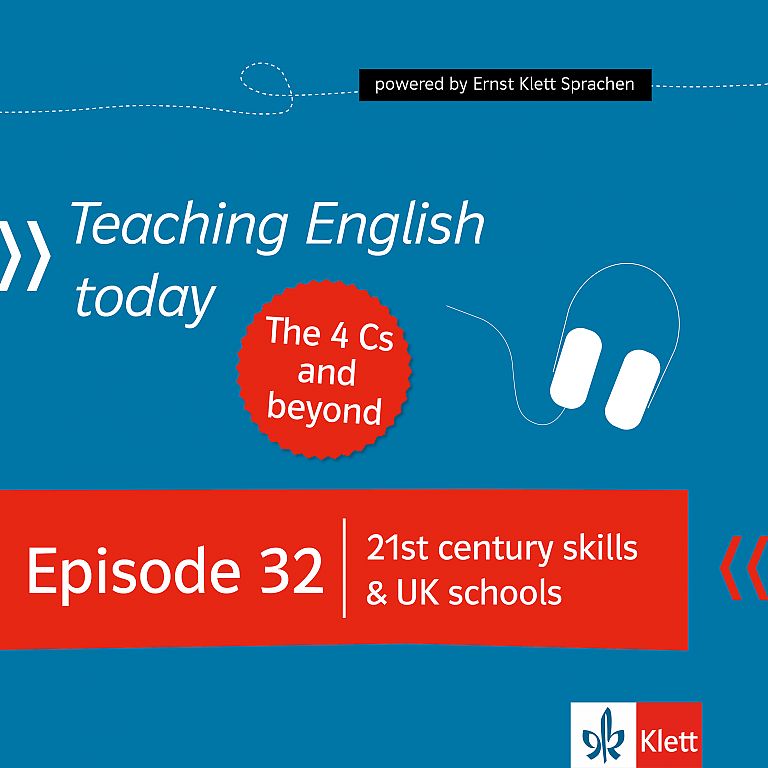
Episode 32
In today's episode I am joined by Matthew Lovett, a former headteacher, now an inspector of schools in England and school governor. He shares insights into a couple of major changes in education in England over the past years, some differences between the independent and state sectors, the growing need for critical thinking skills, a student-led approach to teaching engineering in a prep school, why trainee doctors are being taught art, the importance of debating, and the current state of language teaching among other things. Do listen in to hear what he has to say!
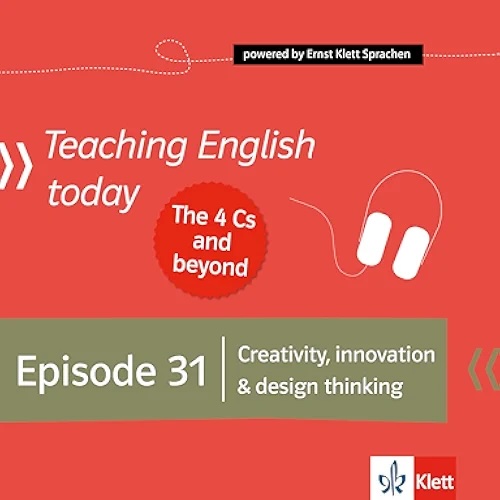
Episode 31
Creativity and innovation are key components of design thinking, a human-centered approach to creatively solving problems. In this episode we'll be looking at what exactly design thinking is, the phases involved in the design thinking process, the kind of mindset people need, and how this creative process can be supported and used in the classroom.
Here are the sources for Episode 31.
Book: Robinson, Ken. Creative Schools: the Grassroots Revolution That's Transforming Education. New York: Penguin Books, 2015.
Online resource: Organization for Economic Co-operation and Development (OECD). "The future of education and skills 2030." Last accessed 11.8.2024.
Article: Brown, Tim. "Design Thinking." Harvard Business Review Magazine, June 2008. Last accessed 11.8.2024.
Interview: "Tim Brown of IDEO on 'Design Thinking'", International Council of Design , 05.01.2011. Last accessed 11.8.2024.
Website: IDEO. Last accessed 11.8.2024.
Interview: "The Wholehearted Life: Oprah Talks to Brené Brown", Oprah website, 15 May 2013. Last accessed 11.8.2024.
Website: Bielenberg & Kelley. DesignKit. Last accessed 11.8.2024.
Blog post: Boyle, Brendan, "10 activities to generate better ideas.", Ideo. Last accessed 11.8.2024.
Interview: "Kevin Kelly and Steven Johnson on Where Ideas Come From", Wired Magazine, 27 September 2010. Last accessed 11.8.2024.
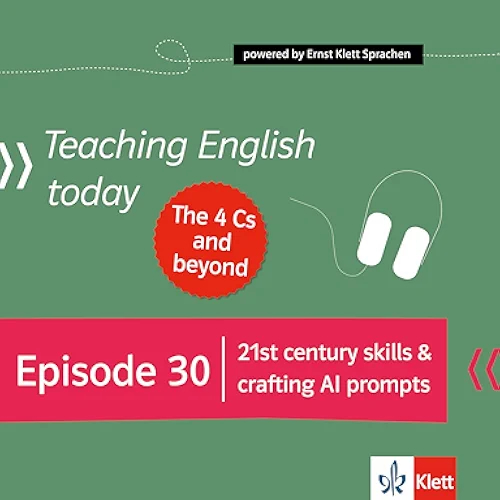
Episode 30
Since ChatGPT's emergence, there have been a lot of debates as to whether to ban it in schools. But does it really hinder critical thinking, problem-solving skills and student agency as some have claimed? On the contrary! In this episode we'll be looking at how these skills are essential for crafting effective AI prompts and evaluating the responses presented by the AI chatbot.
Here are the sources for Episode 30.
Article: Duckworth, Angela & Ungar, Lyle. "Op-Ed: Don't ban chatbots in classrooms - use them to change how we teach." LA Times, 19 January 2023. Last accessed 11.8.2024.
Article: Heaven, Will D. "ChatGPT is going to change education, not destroy it." MIT Technology Review, 6 April 2023. Last accessed 11.8.2024.
Article: "Generative AI in the classroom: From hype to reality?", OECD, 20 July 2023. Last accessed 11.8.2024.
Blog post: Godin, Seth. "Default to Surrender." 9 March 2024. Last accessed 11.8.2024.
Article: "Critical Thinking in the Age of AI." MIT Horizon, 19 March 2024. Last accessed 11.8.2024.
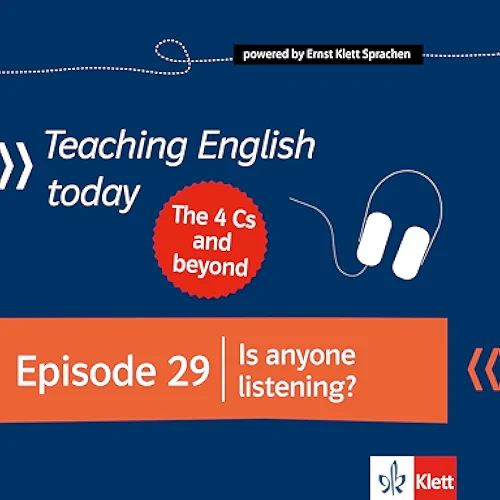
Episode 29
In this episode we'll be taking another look at the key skill of listening. Why is it that many of us tend to overestimate our listening abilities? What does being a good listener really entail? What can we learn from negotiators and journalists? And, of course, what can we do with students to help them focus and listen better? Join me to find out more!
Here are the sources for Episode 29.
Report: Accenture. "ListenLearnLead." February 2015. Last accessed 1.8.2024.
Article: Nichols, Ralph G. & Stevens, Leonard A. "Listening to people." Harvard Business Review Magazine, September 1957. Last accessed 1.8.2024.
Book: Covey, Stephen R. The 7 Habits of Highly Effective People. London: Simon & Schuster, 2020.
Article: Tamir, Diana & Mitchell, Jason P. "Disclosing information about the self is intrinsically rewarding." Proceedings of the National Academy of Sciences of the United States of America, 109(21), 2012. Last accessed 1.8.2024.
TEDx talk: Ury, William. "The Power of Listening." TEDxSanDiego, 7 January 2015. Last accessed 1.8.2024.
Article: Gallo, Carmine. "The Simplest Way For Anyone To Make A Positive First Impression." Forbes Magazine, 13 February 2015. Last accessed 1.8.2024.
Article: Abrahams, Robine & Groysberg, Boris. "How to become a better listener." Harvard Business Review, 21 December 2021. Last accessed 1.8.2024.
Online resource: "Chris Voss teaches the art of negotiation." Masterclass. Last accessed 1.8.2024.
TEDx talk: Headlee, Celeste. "10 ways to have a better conversation." TEDxCreativeCoast, May 2015. Last accessed 1.8.2024.
Book: Murphy, Kate. You're not Listening. What You're Missing and Why it Matters. New York: Celadon Books, 2019.
Article: Marglois, Joshua. "Cultivating the skill and the orientation to listen." Harvard University. Last accessed 1.8.2024.
TED talk: Treasure, Julian. "How to speak so that people want to listen." TED, June 2013. Last accessed 1.8.2024.
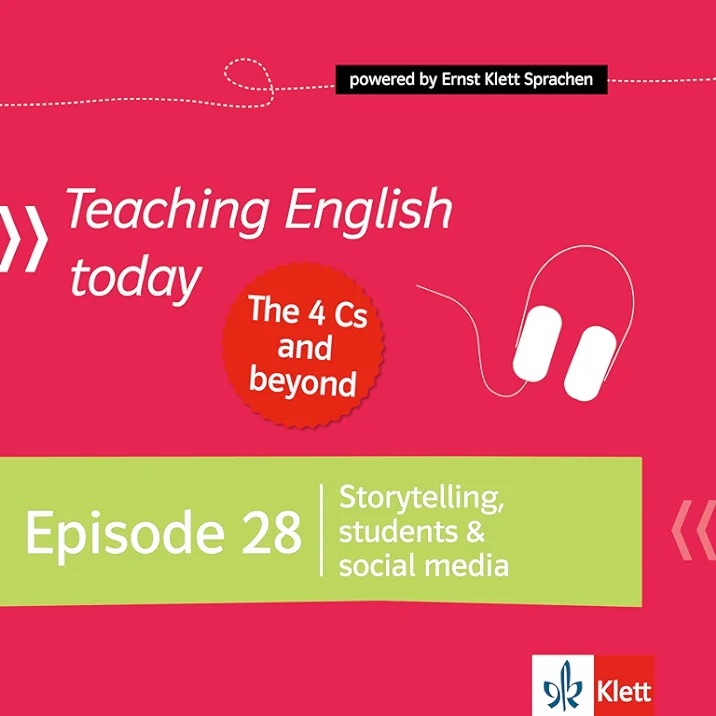
Episode 28
In this episode the English and psychology teacher Katharina Wendrich joins me for a chat about storytelling, students and social media. We delve into how stories can help young people to discover who they are, how social media has changed the way we tell certain stories, how to help students deconstruct stories on social media, using Shakespeare to understand how perspectives can be manipulated, the importance of creating an emotional connection with your audience, as well as other ways to help students think more deeply about their stories and posts.
Here are the links to the two Shakespeare graphic novels mentioned:
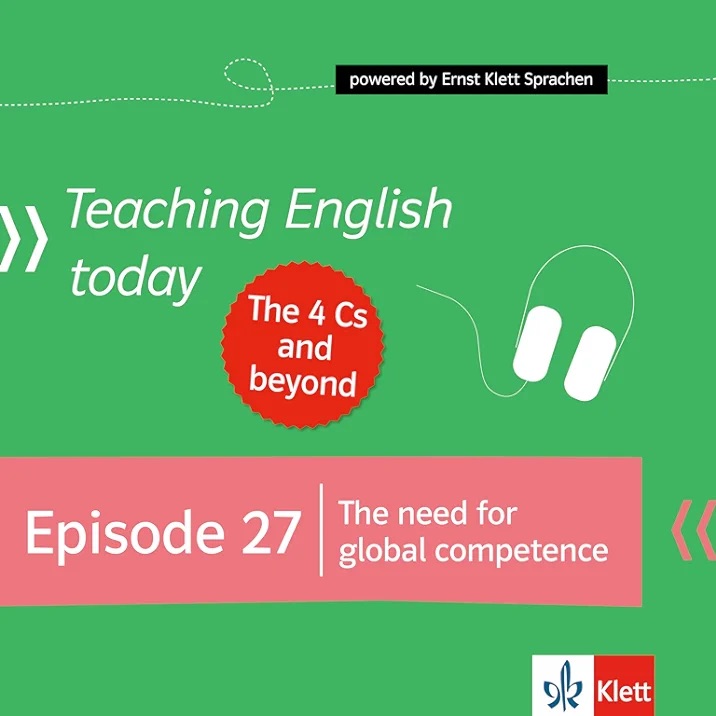
Episode 27
As the world becomes increasingly interconnected and interdependent, the importance of global competence has come to the fore. In 2018 it was even included in the PISA assessment test. In this episode we'll be looking at what it is, how it differs from intercultural competence, factors that are key for its development, as well as at some thinking routines that can be used in the classroom.
Here are the sources for Episode 27.
Publication: "Educating for Global Competence. America's passport to the future." American Council on Education, 1998. Last accessed 10.8.2020.
Publication: Mansilla, V. & Jackson, A. "Educating for Global Competence: Preparing Our Youth to Engage the World." Asia Society, 2011. Last accessed 10.8.2024.
Publication: "Preparing our youth for an inclusive and sustainable world. The OECD PISA global competence framework." The Organisation for Economic Co-operation and Development (OECD), 2018. Last accessed 10.8.2024.
Article: Deardorff, D. K. "Intercultural Competence Model" in "The Identification and Assessment of Intercultural Competence as a Student Outcome of Internationalization at Institutions of Higher Education in the United States." Journal of Studies in International Education 10, Fall 2006. Last accessed 10.8.2024.
Website: The Black British Voices Project. Last accessed 10.8.2024.
Article: Monrose, Kenny. "Black British Voices: "We can't put our trust in a system that doesn't see or hear us." The Voice, 24 May 2021. Last accessed 10.8.2024.
Book: Mansilla, V. & Jackson, A. Educating for Global Competence: Preparing Our Youth to Engage the World. Arlington, VA: ASCD, 2022.
Article: Mansilla, V. "How to be a Global Thinker." Educational Leadership 74(4), 2016. Last accessed 10.8.2024.
Website: "Project Zero." Harvard Graduate School of Education. Last accessed 10.8.2024.
Article: Bullock, D. & Sánchez, R. "What's the Best Way to Communicate on a Global Team?" Harvard Business Review, 22 March 2021. Last accessed 10.8.2024.
Article: Schleicher, A. "Globally competent." International Teacher Magazine, 2021. Last accessed 10.8.2024.
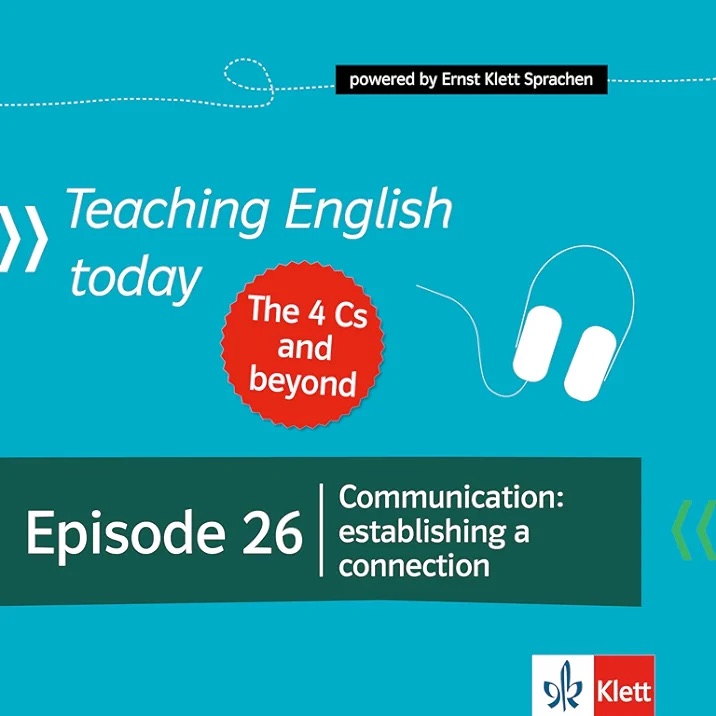
Episode 26
The ability to communicate effectively is one of the most-sought after skills today. Yet even though we spend so much time sharing our ideas, we are not always able to get our message across clearly. Come and join me to find out how communication skills can be improved, what top business leaders do to get their ideas across, why non-verbal communication skills are key, as well as a few ideas for how this can be done in the English-speaking classroom.
Here are the sources for Episode 26.
Book: Gottschall, Jonathan. The Story Paradox. New York: Basic Books, 2021.
Article: Emerson, Mary Sharp. "8 Tips For Better Communication Skills." Forbes Magazine, 6 February 2023. Last accessed 10.8.2024.
Article: Gallo, Carmine. "How Great Leaders Communicate." Harvard Business Review, 23 November 2022. Last accessed 10.8.2024.
Article: Cherry, Kendra. "Types of Nonverbal Communication." Very Well Mind, 22 February 2023. Last accessed 10.8.2024.
Article: Moe, Alexandra. "How theater can teach our kids to be empathetic." The Washington Post, 10 January 2023. Last accessed 10.8.2024.
Article: Llopis, Glenn. "The Greatest Enemy Of Teamwork Is The Illusion That It Has Happened." Forbes Magazine, 5 December 2017. Last accessed 10.8.2024.
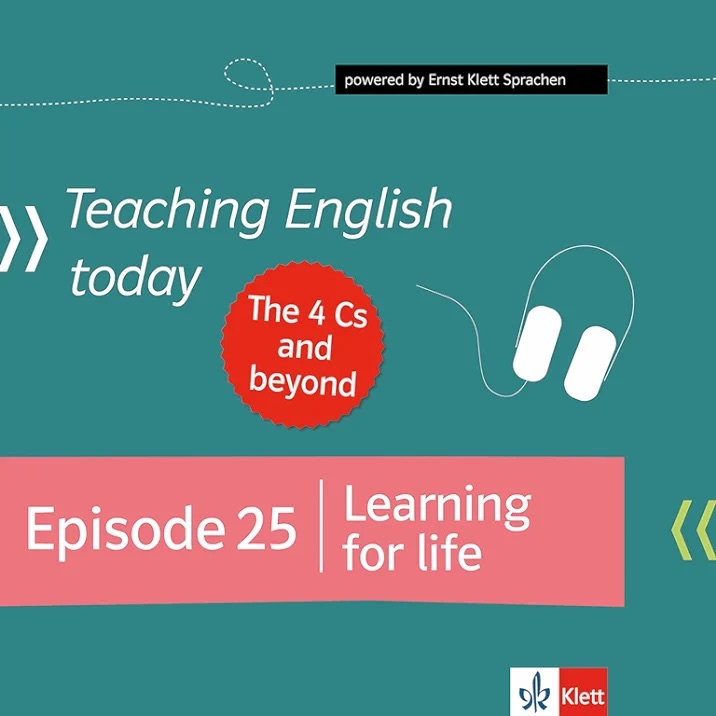
Episode 25
Today, everybody is talking about the importance of lifelong learning. Yet what does it actually entail? In this episode we'll also be exploring the attributes lifelong learners have, to what extent it is possible to cultivate these traits, and why it is important to lay the foundations early on.
Here are the sources for Episode 25.
Blog post: Godin, Seth. "Lifelong Connection." 14 May 2019. Last accessed 9.8.2024.
Article: Andersen, Erika. "Learning to Learn." Harvard Business Review Magazine, March 2016. Last accessed 9.8.2024.
Article: Lundberg, Abbie & Westerman, George. "The Transformer CLO." Harvard Business Review Magazine, March 2016. Last accessed 9.8.2024.
Report: "OECD Skills Outlook 2021: Learning for Life." OECD, 2021. Last accessed 9.8.2024.
Website: Albert Bandura. Last accessed 9.8.2024.
Book: Toffler, Alvin. Future Shock. New York: Random House, 1970.
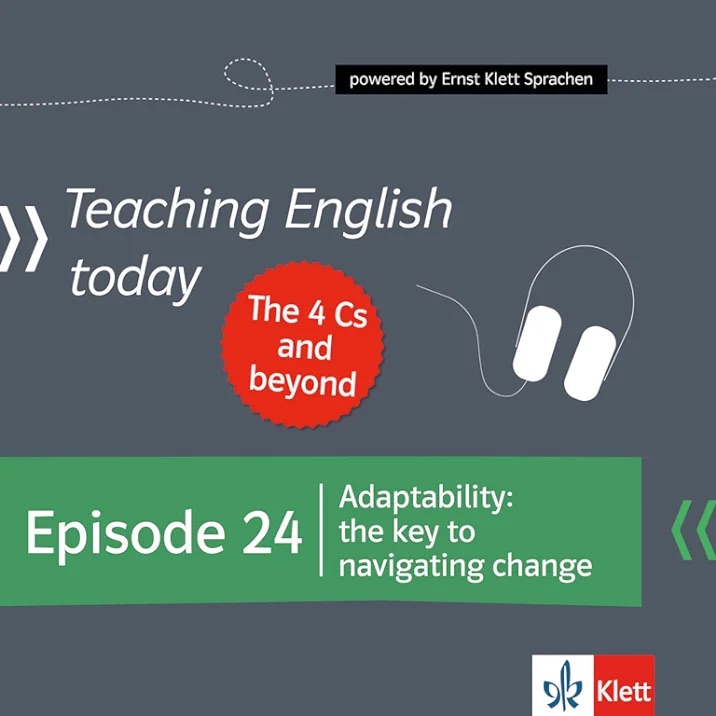
Episode 24
Adaptability is considered vital for the future since technological changes are disrupting work as we know it. But why is it key? Can it be measured? To what extent can we learn to become more adaptable? And why is unlearning so important? Listen in to find out more!
Here are the sources for Episode 24.
Article: Brown, Robert. "Top 10 Jobs of the Future - For 2030 And Beyond" World Economic Forum, 18 May 2021. Last accessed 9.8.2024.
Report: "Workforce of the future. The competing forces shaping 2030." Price Waterhouse Cooper, 2018. Last accessed 9.8.2024.
Article: Dondi, Marcus et al. "Defining the skills citizens will need in the future world of work." McKinsey & Company, 25 June 2021. Last accessed 9.8.2024.
Article: Hill, L. A. et al. "Curiosity, Not Coding: 6 Skills Leaders Need in the Digital Age." Harvard Business School, 14 February 2022. Last accessed 9.8.2024.
Blog: CMOE Team. "4 Reasons Why Flexibility and Adaptability in Leadership Are Needed." Center for Management and Organization Effectiveness. Last accessed 9.8.2024.
Article: Brassey, J et al. "Future proof: Solving the 'adaptability paradox' for the long term." McKinsey & Company, 2 August 2021. Last accessed 9.8.2024.
Article: Adami, Marina. "Is ChatGPT a threat or an opportunity for journalism? Five AI experts weigh in." Reuters Institute, 23 March 2023. Last accessed 9.8.2024.
Article: Murray, Seb. "Is 'AQ' more important than intelligence?" BBC, 6 November 2019. Last accessed 9.8.2024.
TED talk: Fratto, Nathalie "3 ways to measure your adaptability - and how to improve it." TED, May 2019. Last accessed 9.8.2024.
TED-Ed talk: Sandlin, Destin "The backwards brain bicycle: un-doing understanding." TED-Ed. Last accessed 9.8.2024.
Interview: "The Most Valuable Skills." Stanford eCorner, 19 April 2023. Last accessed 9.8.2024.
Article: Advani, Asheesh. "Education 4.0: Here are 3 skills that students will need for the jobs of the future." World Economic Forum, 2 January 2023. Last accessed 9.8.2024.
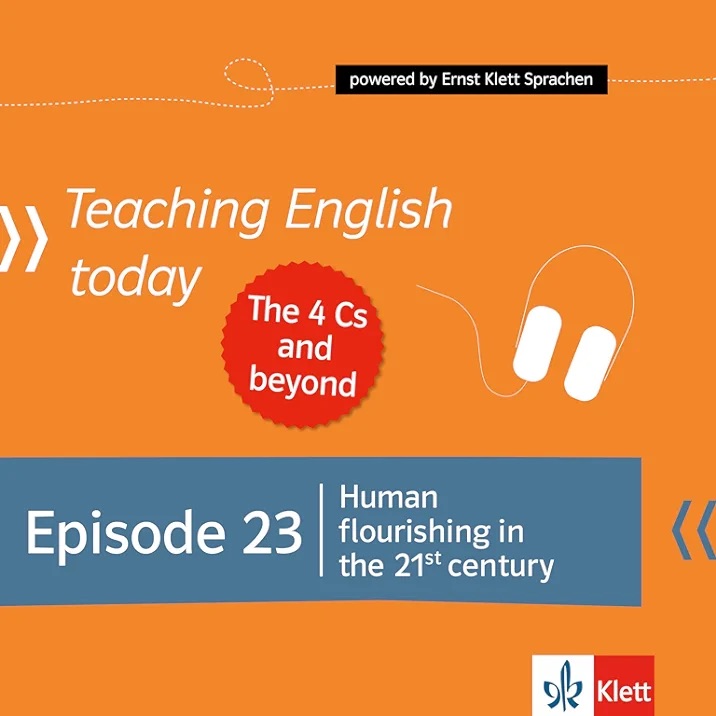
Episode 23
Today, our world is changing at such a rapid pace that it is difficult to know what the future of work might look like. So how can we best prepare young people for what is to come? Experts are now talking about redirecting our focus towards human flourishing to equip young people with the skills and attitudes they will need to navigate these changes. But what does human flourishing actually mean? What skills and attitudes does this encompass? And, of course, how can we incorporate some of this into the English-speaking classroom?
Here are the sources for Episode 23.
Website: Health equity and policy lab. University of Pennsylvania. Last accessed 10.8.2024.
Podcast: Stories of Impact. Episode "Human Flourishing & Grit with Angela Duckworth." Templeton World Charity Foundation, 28 February 2022. Last accessed 10.8.2024.
Website: The Human Flourishing Program at Harvard's Institute for Quantitative Social Science. Last accessed 10.8.2024.
TED talk: Robinson, Ken. "Bring on the Learning Revolution!" TED, February 2010. Last accessed 10.8.2024.
Website: Global Scientific Conference on Human Flourishing. Last accessed 10.8.2024.
Report: Leadbeater, Charles. "Learning on purpose: Ten lessons in placing student agency at the heart of schools." Centre for Strategic Education, Victoria, February 2022. Last accessed 10.8.2024.
TED talk: Dweck, Carol S. "The power of believing that you can improve." TEDxNorrkoping, December 2014. Last accessed 10.8.2024.
Article: Synder, Charles R. "Hope theory: Rainbows in the mind." Psychological Inquiry, 13(4), 2022. Last accessed 10.8.2024.
Article: Ripley, Amanda. "This element is critical to human flourishing - yet missing from the news." The Washington Post, 30 March 2023. Last accessed 10.8.2024.
Article: Lopez, German. "Climate Optimism." The New York Times, 3 April 2022. Last accessed 10.8.2024.
Article: Fleming, Nora. "In Schools, Finding Hope at a Hopeless Time." Edutopia, 26 March 2021. Last accessed 10.8.2024.
TED talk: Urban, Tim. "Inside the mind of a major procrastinator" TED, February 2016. Last accessed 10.8.2024.
Speech: Obama, Michelle. "Remarks by The First Lady during Keynote Address at Young African Women Leaders Forum." Soweto, South Africa, 22 June 2011. Last accessed 10.8.2024.
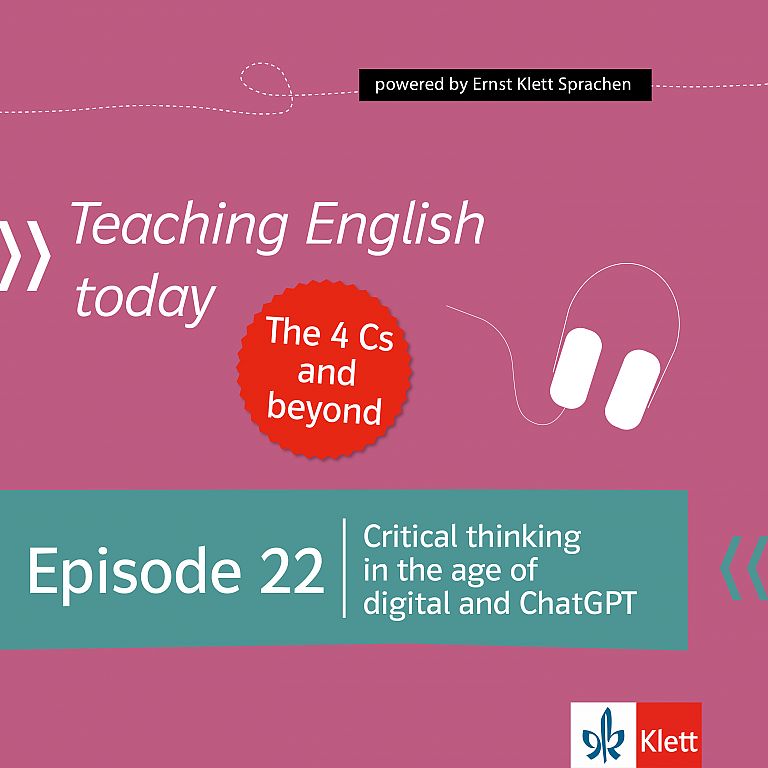
Episode 22
In today's digital world, we need critical thinking more than ever. The ability to be able to judge the credibility of sources and formulate plausible hypotheses are key. So what can we learn from professional fact checkers? What happens if we delegate search tasks to AI chatbots like ChatGPT? And what implications might this have for the classroom? Listen in to find out more!
Here are the sources for Episode 22.
Online resource: Ennis, Robert. "The Nature of Critical Thinking: An Outline of Critical Thinking Dispositions and Abilities." Last revised May, 2021. Last accessed 5.4.2023.
Article: Coleman, John. "Critical Thinking Is About Asking Better Questions." Harvard Business Review, 22 April 2022. Last accessed 5.4.2023.
Article: Wineburg, Sam. "To Avoid Getting Duped By Fake News, Think Like A Fact Checker." Huffington Post, 18 December 2018. Last accessed 5.4.2023.
Article: Wineburg, Sam, et al. "Lateral reading on the open internet". Journal of Educational Psychology, April 2022. Last accessed 5.4.2023.
Article: Hess, Frederick M. "The Stanford Scholar Bent on Helping Digital Readers Spot Fake News", Education Week, 9 April 2021. Last accessed 5.4.2023.
Article: Langr, Ondrej. "AI vs Critical Thinking - A Chat with ChatGPT", Medium, 14 February 2023. Last accessed 5.4.2023.
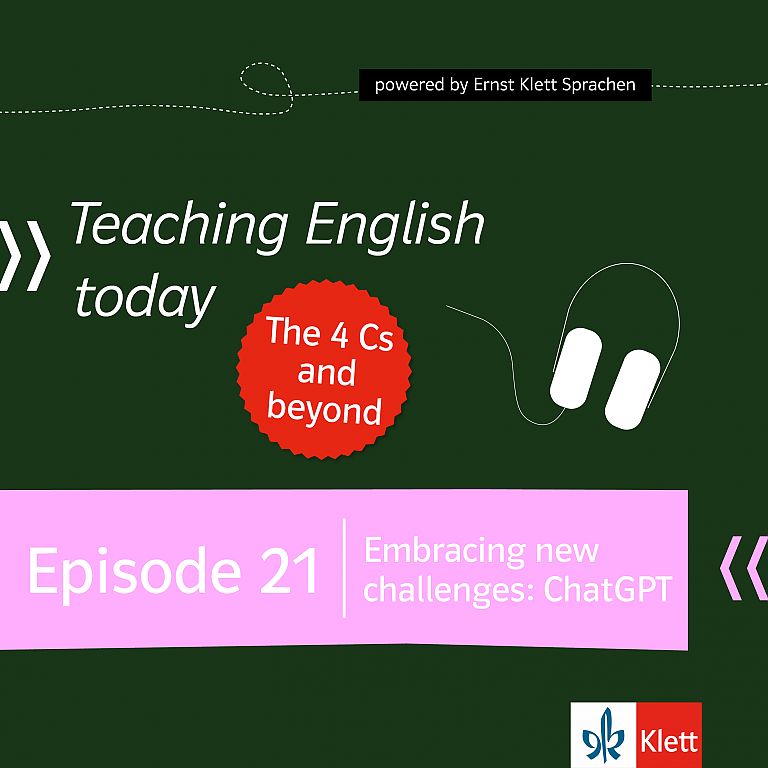
Episode 21
ChatGPT has been causing quite a stir. But what can really it do? What are its limitations? What does it mean for journalism? What might it mean for students and how will it affect the skills that they need in the future? To find out more, I chatted to a software engineer for a news organisation in the UK who has been working with ChatGPT for some time.
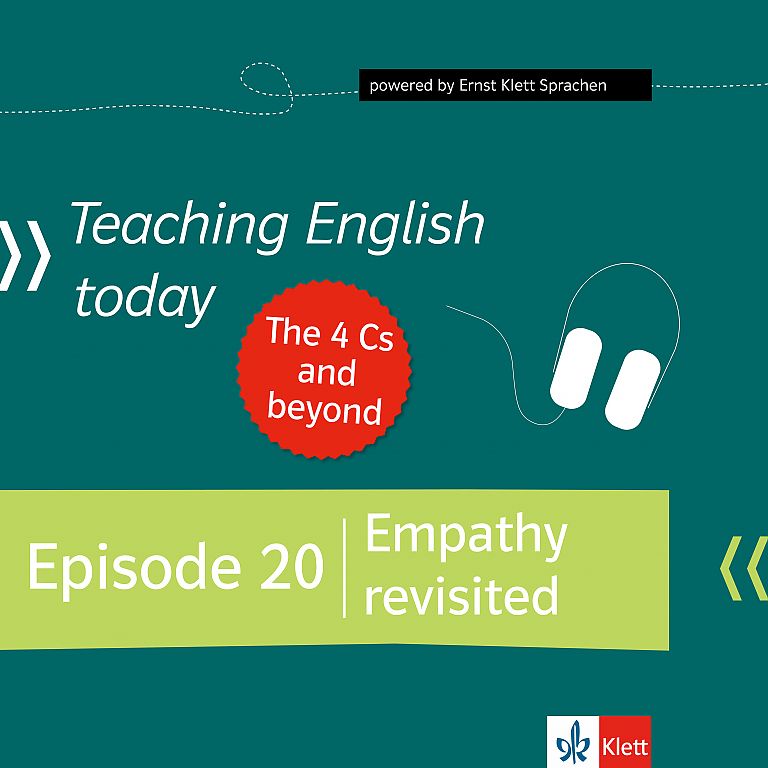
Episode 20
Empathy has been described as the psychological "superglue" that connects people, yet today it is in decline. In this episode, I'll be looking at why this is, its importance, what steps we can take to cultivate it, as well as a few ideas for the classroom.
Here are the sources for Episode 20.
Book: Davis, M.H. "Empathy" in Encyclopaedia of Mental Health (Second Edition) Amsterdam: Elsevier, 2016.
Book: Riess, Helen. The Empathy Effect, Boulder, Colorado: Sounds True, 2018.
Online resource: "Our best advice", Northwestern Magazine, 1 June 2020. Last accessed 9.8.2024.
Interview: "How to increase empathy and unite society." The Economist, 7 June 2019. Last accessed 9.8.2024.
Podcast: Speaking of Psychology Episode 189 "Is technology killing empathy? With Sherry Turkle, PhD." American Psychological Association, May 2022. Last accessed 9.8.2024.
TEDx talk: Baron-Cohen, Simon "The erosion of empathy." TEDxHousesofParliament, 12 September 2012. Last accessed 9.8.2024.
Report: Van Bommel, T. "The Power of Empathy in Times of Crisis and Beyond." Catalyst, 2021. Last accessed 9.8.2024.
Article: Hougaard, Rasmus et al. "Connect with Empathy, But Lead with Compassion." Harvard Business Review, 23 December 2021. Last accessed 9.8.2024.
Interview: "Stanford scholar examines how to build empathy in an unjust world." Stanford Report, 5 June 2019. Last accessed 9.8.2024.
Article: Abramson, Ashley. "Cultivating empathy." Monitor on Psychology 52/8, 1 November 2021. Last accessed 9.8.2024.
Article: Turkle, Sherry. "Empathy Rules." Harvard Business Review, 17 February 2022. Last accessed 9.8.2024.
Website: Making Caring Common. Last accessed 9.8.2024.
Website: War for Kindness. Last accessed 9.8.2024.
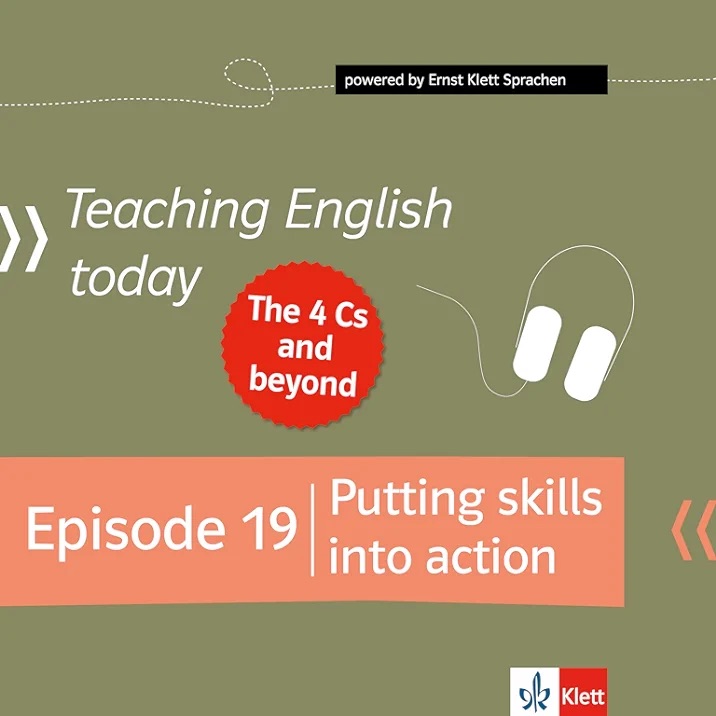
Episode 19
Students joined together at the Creators Camp this summer to come up with ideas for the school of the future. It was an event that saw students having to put 21st century skills in action to work towards a common goal. I visited headteacher Ursula Kick Bernklau, one of the initiators, to find out more about this fascinating project and how 21st century skills are incorporated into everyday life at her school.

Episode 18
Leadership is about being inspired and inspiring others. It numbers among the top ten job skills for the coming years. In this episode we'll be looking at the difference between leaders and managers, what all good leaders have in common, which other skills leadership entails, and how we can help students to develop some of these in the classroom.
Here are the sources for Episode 18.
Article: Vagianos, Alanna. "Ruth Bader Ginsburg Tells Young Women: 'Fight For The Things You Care About'." Harvard Radcliffe Institute, 2 June 2015. Last accessed 8.8.2024.
Report: Whiting, Kate. "These are the top 10 job skills of tomorrow – and how long it takes to learn them." World Economic Forum, 21 October 2020. Last accessed 8.8.2024.
Article: Morgan, Jacob. "Manager vs. Leader." LinkedIn, 3 February 2022. Last accessed 8.8.2024.
Article: Dublino, Jennifer. "What Your Business Can Learn From Peter Drucker." Business.com, updated 15 August 2023. Last accessed 8.8.2024.
Interview: "Independent Teacher Chats With Daniel Goleman." NAIS, Fall 2013. Last accessed 8.8.2024.
Article: Goleman, Daniel "What makes a leader?" Harvard Business Review Magazine, January 2004. Last accessed 8.8.2024.
Article: Goleman, Daniel "Why leaders need a triple focus." Greater Good Magazine, 21 January 2014. Last accessed 8.8.2024.
Book: DuBrin, Andrew J. Leadership: Research Findings, Practice and Skills. Boston, MA: Cengage Learning 2016.
Online resource: "Future of Education and Skills 2030." OECD website. Last accessed 8.8.2024.
Interview: "Interviews with Outstanding Listeners." (Series 2) Global Listening Centre. Last accessed 8.8.2024.
Article: The Learning Network. "What Students Are Saying About Emotional Intelligence, Speaking Their Mind at School and Underappreciated Sports." The New York Times, 17 March 2022. Last accessed 8.8.2024.
Book: Covey, Stephen R. The 7 Habits of Highly Effective People. London: Simon & Schuster, 2020.
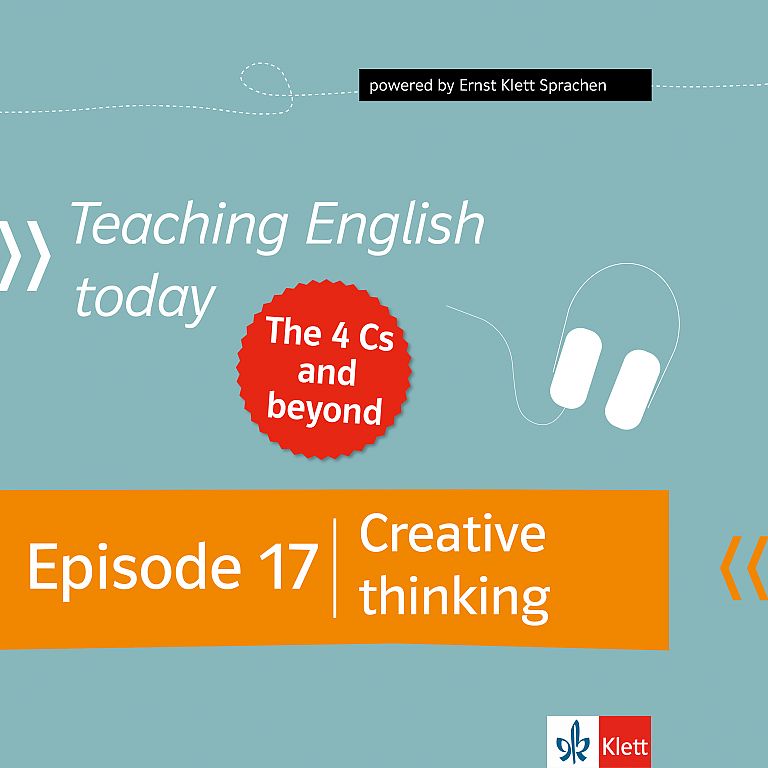
Episode 17
Creative thinking is a process that we use to generate or iterate on ideas. It is an essential skill, especially if we are to tackle the issues confronting us today. In this episode we'll be looking at what creative thinking entails, different types of thinking and how to support the creative thinking process.
Here are the sources for Episode 17.
Report: "The Durham Commission on Creativity in Education." October 2019. Last accessed 8.8.2024.
Interview: "An Interview with E. Paul Torrance: About Creativity.", Educational Psychology Review 10/4, (December 1998). Last accessed 8.8.2024.
Article: OECD, "PISA 2022 Creative Thinking." OECD website. Last accessed 8.8.2024.
TED talk: De Brabandere, Luc. "Reinventing critical thinking." TED@BCG, June 2015. Last accessed 8.8.2024.
Book: De Brabandere, Luc & Iny, Alan Thinking in New Boxes. A New Paradigm for Business Creativity. New York: Random House, 2013.
Video: Manning, Anne. "Convergent vs. Divergent Thinking." Harvard DCE, 16 May 2016. Last accessed 8.8.2024.
Article: Iny, Alan, "How does Creativity Really Work?" Boston Consulting Group website, 12 June 2014. Last accessed 8.8.2024.
Book chapter: Renzulli J. "Developing Creativity Across All Areas of the Curriculum." In: Beghetto RA, Kaufman JC, eds. Nurturing Creativity in the Classroom. Current Perspectives in Social and Behavioral Sciences. Cambridge: Cambridge University Press; 2016.
Website: Centre for Real-World Learning, University of Winchester. Last accessed 8.8.2024.
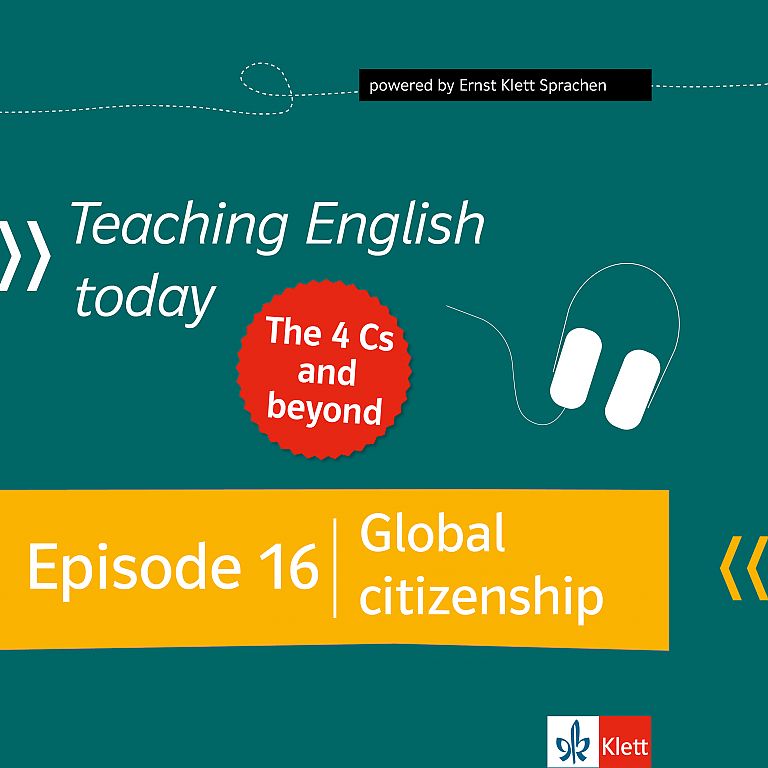
Episode 16
The concept of global citizenship has come to the fore in recent years, as countries and cultures have become increasingly interconnected and interdependent. People have realised we urgently need to stop focusing on individual and local perspectives and to consider global implications and contexts. In this episode we'll be looking at what global citizenship is and what it entails, how young people view it, as well as some activities that can be done in the classroom to foster it.
Here are the sources for Episode 16.
Website: UN. "Global Citizenship." Last accessed 27.7.2024.
Website: UN. "Sustainable Development Goals." Last accessed 27.7.2024.
Website: UN. "Universal Declaration of Human Rights." Last accessed 27.7.2024.
Article: Carlin, Scott & Choi, YuKang. "The Role of Civil Society in Advancing Global Citizenship" UN website. Last accessed 27.7.2024.
Report: Varkey Foundation. "Generation Z: Global Citizenship Survey." 2017. Last accessed 27.7.2024.
Report: "International Youth White Paper on Global Citizenship." March 2017. Last accessed 27.7.2024.
TED talk: Evans, Hugh. "What does it mean to be a citizen of the world?" TED, February 2016. Last accessed 27.7.2024.
Article: Grimley, Naomi. "Identity 2016: 'Global citizenship' rising, poll suggests." BBC, 28 April 2016. Last accessed 27.7.2024.
Website: "Project Zero." Harvard Graduate School of Education. Last accessed 27.7.2024.
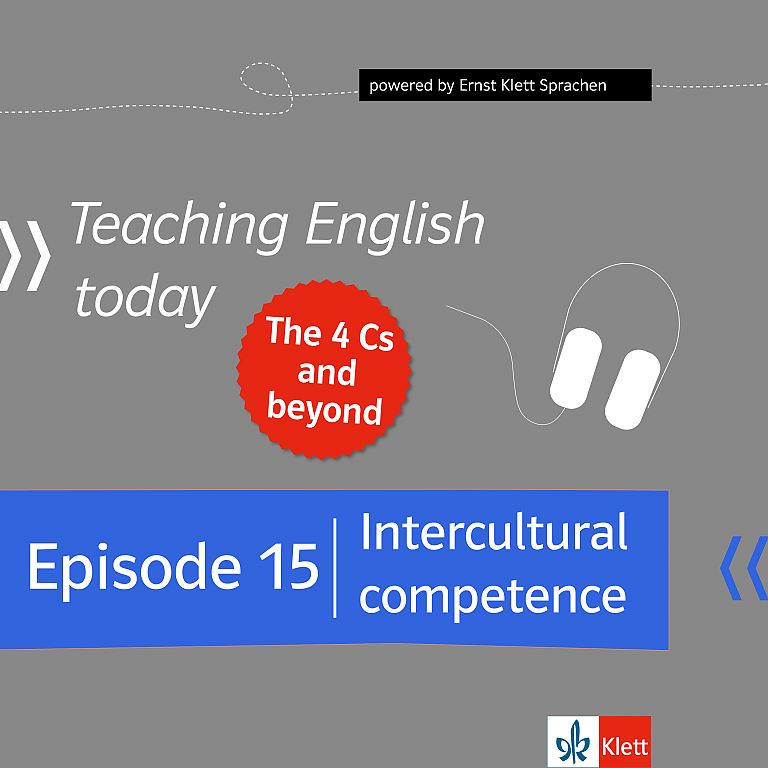
Episode 15
The need for intercultural competence has never been greater and it's considered essential in global business environments. Developing it takes time because it's a complex process that involves other core skills such as listening and empathy. In this episode we'll be looking at what intercultural competence entails, the different stages we go through as we develop it, as well as its importance for the English classroom.
Here are the sources for Episode 15.
Book: Fuentes, Carlos. Myself with Others. Selected Essays. New York: Farrar Straus & Giroux, 1988.
Article: Deardorff, Darla K. "The Identification and Assessment of Intercultural Competence as a Student Outcome of Internationalization at Institutions of Higher Education in the United States." Journal of Studies in International Education 10/3, Fall 2006. Last accessed 10.8.2024.
Interview: "Milton Bennett", Organizing Engagement. Last accessed 10.8.2024.
Article: Bennett, Milton "Becoming Interculturally Competent." International
encyclopedia of intercultural communication, 2017. Last accessed 10.8.2024.

Episode 14
Today, the ability to share our ideas through effective presentations is absolutely key. But many of us are frightened of speaking in public. So, what can we do to conquer this fear? In this episode we'll also be looking at some of the different formats we have for sharing our ideas, why every presentation begins with the audience, and how we can help students to develop their presentation skills.
Here are the sources for Episode 14.
Book: Anderson, Chris. TED Talks. The Official TED Guide to Public Speaking. Boston: Houghton Mifflin Harcourt, 2016.
Book: Karle, Elizabeth & Pittmann, Catherine. Rewire your Anxious Brain. How to Use the Neuroscience of Fear to End Anxiety, Panic, and Worry. Oakland, CA: New Harbinger Publications, 2015.
Article: Gershman, Sarah. "To Overcome Your Fear of Public Speaking, Stop Thinking About Yourself." Harvard Business Review, 17 September 2019. Last accessed 6.5.2024.
Book: Covey, Stephen R. The 7 Habits of Highly Effective People. London: Simon & Schuster, 2020.
Article: Gallo, Carmine. "The art of the elevator pitch." Harvard Business Review, 3 October 2018. Last accessed 6.5.2024.
TED talk: Robinson, Ken. "Do schools kill creativity?" TED, February 2006. Last accessed 6.5.2024.
TED talk: Treasure, Julian. "How to speak so that people want to listen." TED, June 2013. Last accessed 6.5.2024.
Website: Medina, John. "Brain rules". Last accessed 6.5.2024.
Book: Duckworth, Angela L. Grit. Why Passion and Resilience are the Secrets to Success. London: Vermilion, 2017.

Episode 13
Storytelling is in our genes. We have always used stories to understand the world around us. And in the 21st century, we need them more than ever to be able to share our ideas and inspire others. Join me to find out how the storyteller's brain connects with the listener's, what makes an effective story, as well as a few ideas for storytelling in the classroom.
Here are the sources for Episode 13.
Book: Le Guin, Urusula K. The Language of the Night. New York: HarperCollins, 1992.
Book: Harari, Yuval Noah. 21 Lessons for the 21st Century. New York: Spiegel & Grau, 2018.
Book: Gottschall, Jonathan. The Storytelling Animal. How Stories Make Us Human. New York: Mariner Books, 2013.
Book: Gallo, Carmine. The Storyteller's Secret. From TED Speakers to Business Legends, Why Some Ideas Catch On and Others Don't. London: Pan Books, 2018.
Interview: "Q&A with Professor of Neuroscience Uri Hasson.", Medium, 10 January 2020. Last accessed 6.5.2024.
Article: Zak, Paul J. "How Stories Change the Brain." Greater Good Magazine, 17 December, 2013. Last accessed 6.5.2024.
Book: Jiwa, Bernadette. What Great Storytellers Know. Vancouver: Page Two Books, 2020.
Book: Haidt, Jonathan. The Righteous Mind. Why Good People are Divided by Politics and Religion. London: Penguin, 2013.
Podcast: HBR IdeaCast Episode 840. "The positives - and perils - of storytelling." Harvard Business Review, 8 February 2022. Last accessed 6.5.2024.
Article: Smith, Jeremy Adam. "The Science of the Story." Greater Good Magazine , 8 June 2016. Last accessed 6.5.2024.
Article: Newman, Kira M. "A Simple Story Can Improve Students' Grades in Science", Greater Good Magazine, 27 May 2016. Last accessed 6.5.2024.
Article: Siegler, Lin et al. "Instructional Interventions that Motivate Classroom Learning." Journal of Educational Psychology 108(3), (2016). Last accessed 6.5.2024.
TED talk: Adichie, Chimamanda Ngoui. "The Danger of a Single Story." TED, July 2009. Last accessed 6.5.2024.
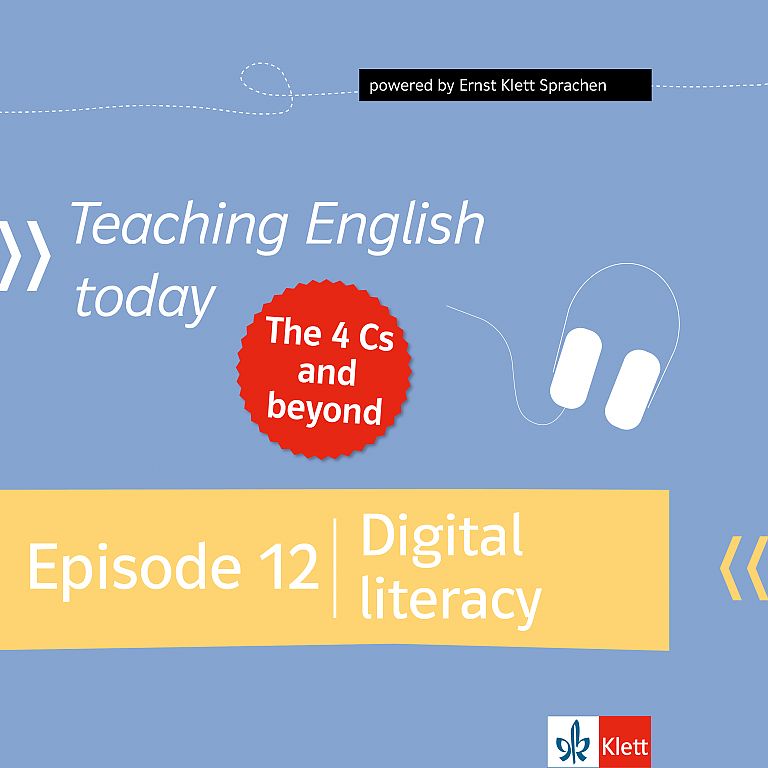
Episode 12
Digital literacy is not just about knowing how to find and consume information, it's also about creating and communicating. But the choice of media will depend on the target audience and our purpose. In this episode we'll be looking at some of the different media on offer, as well as steps students need to take when creating and communicating using digital means.
Here are the sources for Episode 12.
Website: American Library Association. Last accessed 4.4.2023.
Website: JISC. "Guide: Developing digital literacies." Last accessed 4.4.2023.
Book: Jenkins, Henry. Convergence Culture: Where Old and New Media Collide. New York: New York University Press, 2006.
Book: Hobbs, Renee. Create to Learn: Introduction to Digital Literacy. Hoboken: John Wiley, 2017.
Book: Dudeney, Gavin et al. Digital Literacies. New York: Routledge, 2014.
Report: Medienpädagogischer Forschungsverbund Südwest (MPFS). JIMplus 2020. Last accessed 4.4.2023.
Book: Lessig, Lawrence. Remix: Making Art and Commerce Thrive in the Hybrid Economy. London: Bloomsbury, 2008.
Article: Rosen, Larry D. "Obsessive/Addictive 'Tiny Red Dots'." Psychology Today, 11 March 2018. Last accessed 4.4.2023.
Online resource: "Can the Internet save the book?", Salon, 9 July 2010. Last accessed 4.4.2023.
Online resource: Rodriguez, Brandon. "The power of creative constraints", TED-Ed, 2017. Last accessed 4.4.2023.
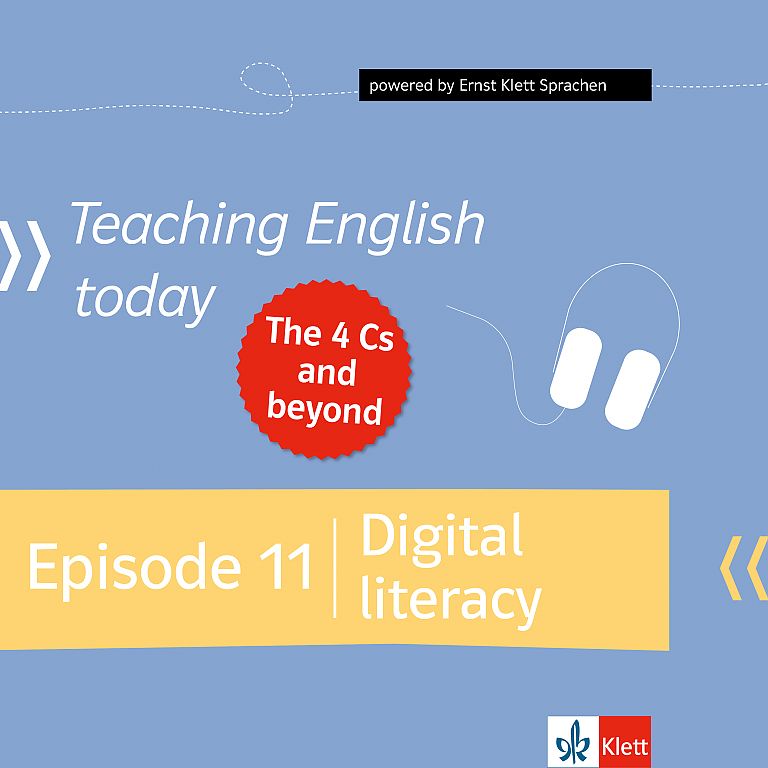
Episode 11
What does it mean to be literate in today's world? How can we help students to confidently navigate the digital sphere? In this episode we'll be looking at three key steps we need to take and how we can help students to become better at validating knowledge online.
Here are the sources for Episode 11.
Article: Shirky, Clay. "Does the Internet make you smarter?" Wall Street Journal, 4 June 2010. Last accessed 4.4.2023.
Online resource: Organization for Economic Co-operation and Development (OECD). "21st-Century Readers: Developing Literacy Skills in a Digital World." Last accessed 4.4.2023.
Website: JISC. "Guide: Developing digital literacies." Last accessed 4.4.2023.
Website: Stanford History Education Group. "Civic Online Reasoning" Last accessed 4.4.2023.
Article: Grind, Kirsten, et al. "How Google Interferes With Its Search Algorithms and Changes Your Results" Wall Street Journal, 15 November 2019. Last accessed 4.4.2023.
Article: Rosen, Larry D. "Obsessive/Addictive 'Tiny Red Dots'." Psychology Today, 11 March 2018. Last accessed 4.4.2023.
Book: Jenkins, Henry. Convergence Culture: Where Old and New Media Collide. New York: New York University Press, 2006.
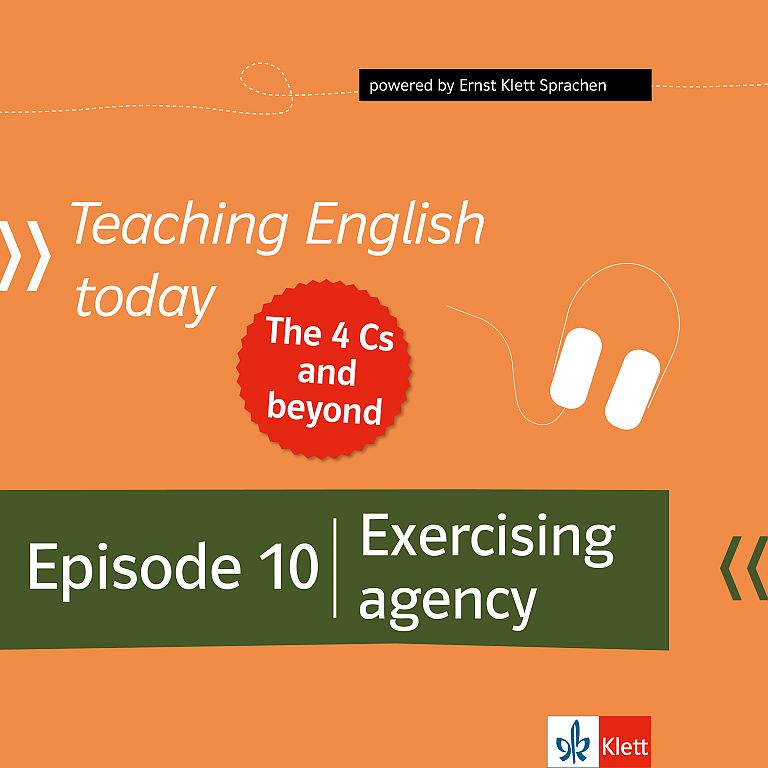
Episode 10
Learner agency is not only important for school but essential for life-long learning. It's not a quality that we are either born with or not, but an ongoing process that unfolds over time. In this episode we'll be looking at what it entails, other qualities that are key, as well as how its development can be supported in the English-speaking classroom.
Here are the sources for Episode 10.
Online resource: Organization for Economic Co-operation and Development (OECD). "The future of education and skills 2030." Last accessed 4.4.2023.
Online resource: Organization for Economic Co-operation and Development (OECD). "Student Agency for 2030." Last accessed 4.4.2023.
Book: Livio, Mario. Why? What Makes Us Curious. New York: Simon & Schuster, 2017.
Article: Schoon, Ingrid. "Section 1 : Conceptualising Learner Agency : A Socio-Ecological Developmental Approach." (2018). Last accessed 4.4.2023.
Article: Leadbeater, Charles. "Student agency: Learning to make a difference." (2017). Last accessed 4.4.2023.
Website: Albert Bandura. Last accessed 4.4.2023
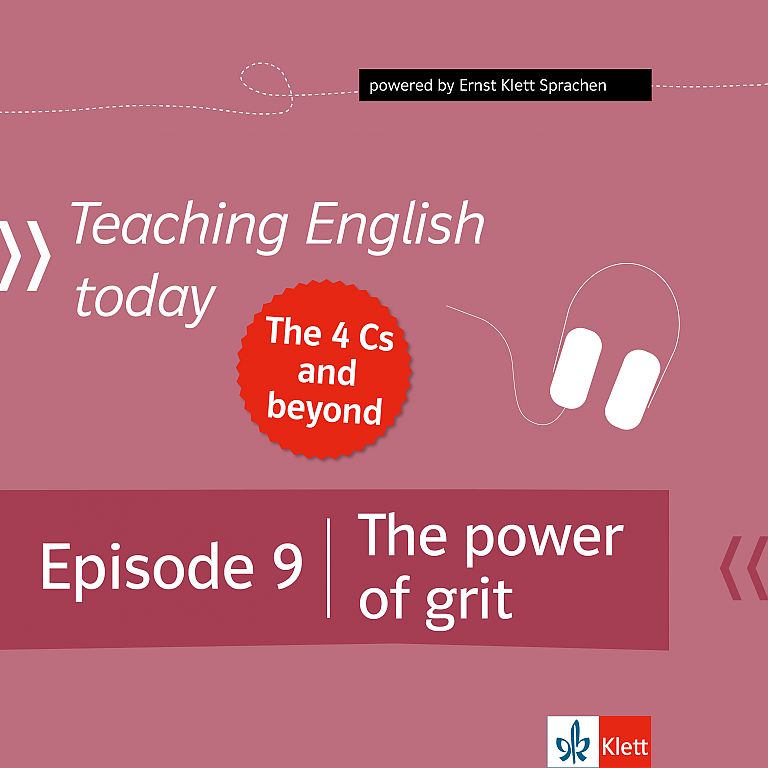
Episode 9
Grit has been shown to play a key role in why people succeed. But what is it that makes some people grittier than others? In this podcast we'll be looking at the role resilience plays, how a growth mindset is key and some strategies suggested by experts for building grit that also work in the classroom.
Here are the sources for Episode 9.
Report: World Economic Forum, "New Vision for Education." Last accessed 4.4.2023.
Article: Duckworth AL, et al. "Grit: perseverance and passion for long-term goals." J Pers Soc Psychol. 2007. Last accessed 4.4.2023.
TED talk: Duckworth, Angela. "Grit. The power of passion and perseverance." TED, March 2014. Last accessed 4.4.2023.
Book: Duckworth, Angela L. Grit. Why Passion and Resilience are the Secrets to Success. London: Vermilion, 2017.
Book: Dweck, Carol S. Mindset - The New Psychology of Success. New York: Ballantine Books, 2007.
Article: Dweck, Carol S. "Growth mindset actually means." Harvard Business Review, 16 January 2016. Last accessed 4.4.2023.
Article: Dweck, Carol S. "Growth Mindset: where did it go wrong?" Times Educational Supplement, 11 April 2020. Last accessed 4.4.2023.
TED talk: Dweck, Carol S. "The power of believing that you can improve." TEDxNorrkoping, December 2014. Last accessed 4.4.2023.
Book: Tomlinson, Carol Ann. The differentiated classroom. Alexandria: ASCD, 2014.
Interview: "You're no genius": Her father's shutdowns made Angela Duckworth a world expert on grit." Quartz at work, 26 March 2018. Last accessed 4.4.2023.
Article: Berger, Ron "Our Kids Are Not Broken." The Atlantic, 20 March 2021. Last accessed 4.4.2023.
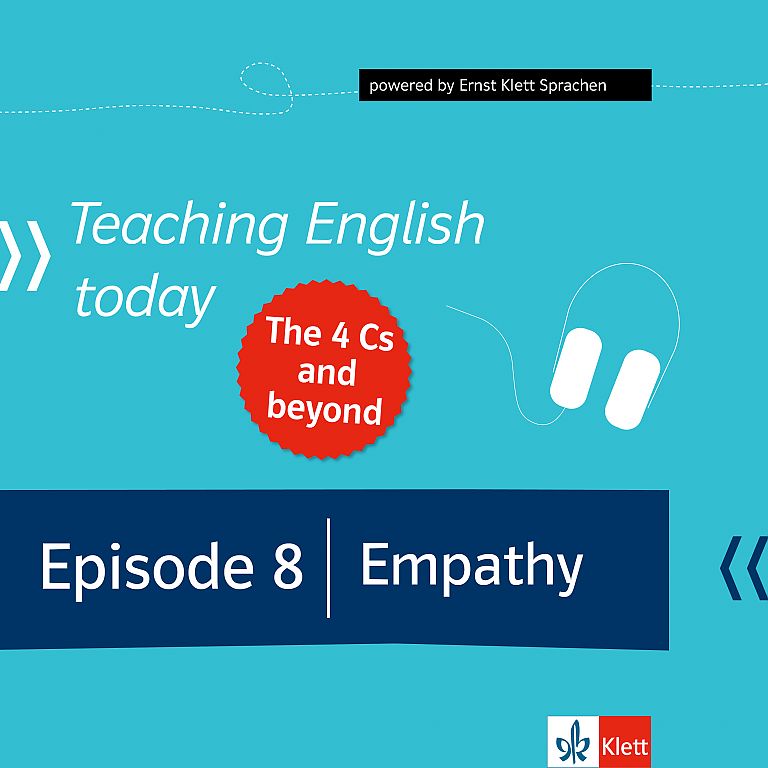
Episode 8
Empathy is considered one of the most important resources we have. But what is it? What habits do highly empathetic people have, and how can we learn to develop greater empathy? In this episode I'll also be talking to the English teacher Andrea Holler about how she encourages empathy in the classroom.
Here are the sources for Episode 8.
Book: Lee, Harper. To Kill a Mockingbird. New York: HarperCollins, 2002.
Book: Baron-Cohen, Simon. Zero Degrees of Empathy. London: Penguin, 2012 .
Article: Krznaric, Roman. "Six Habits of Highly Empathetic People". Greater Good Magazine, 27 November 2012. Last accessed 12.12.2021.
Online resource: "Points of View." The Guardian, 1986. Last accessed 12.12.2021.
TED talk: Riess, Helen. "The Power of Empathy." TEDxMiddlebury, December 2013. Last accessed 12.12.2021.
Speech: Obama, Barack. "Remarks of President Barack Obama at student roundtable." Istanbul, 2009. Last accessed 12.12.2021.
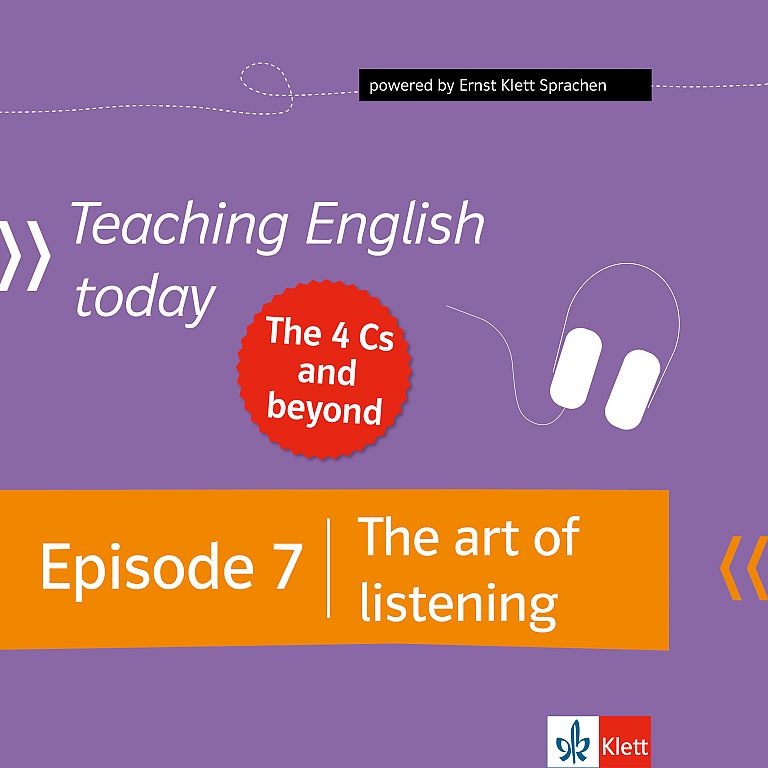
Episode 7
In this episode we'll be exploring the art of listening, a skill that many people feel is sorely neglected today. We'll be looking at what makes a good listener, why active listening is key, and how to help students to hone the skill that is at the root of all (language) learning.
Here are the sources for Episode 7.
Article: Nichols, Ralph G. & Stevens, Leonard A. "Listening to People". Harvard Business Review Magazine, September 1957.
Book: Plutarch. Essays. New York: Penguin, 1992.
Book: Murphy, Kate. You're not Listening. What You're Missing and Why it Matters. New York: Celadon Books, 2019.
TED talk: Oliveros, Pauline. "The difference between hearing and listening." YouTube uploaded by TEDxIndianapolis, October 2015. Last accessed 4.4.2023.
Article: Horowitz, Seth S. "The Science and Art of Listening". New York Times, 9 November 2012. Last accessed 4.4.2023.
Online resource: Zenger, Jack & Folkman, Joseph. "What Great Listeners Actually Do." Harvard Business Review, 14 July 2016. Last accessed 4.4.2023.
Book: Rogers, Carl R. & Farson, Richard Evans. Active Listening. Mansfield Centre: Martino Publishing, 2015.
TED talk: Treasure, Julian. "5 Ways to Listen Better." TEDGlobal 2011, July 2011. Last accessed 4.4.2023.
Performance: Kirill Petrenko & Berlin Philharmonic. John Cage: 4'33'' performed on 31 October 2020. Last accessed 4.4.2023.
Interview: Beebe, Steven A. & Purdy, Michael. "Interviews with Outstanding Listeners." Last accessed 4.4.2023.
Blog post: Godin, Seth. "How to listen." 4 February 2013. Last accessed 4.4.2023.
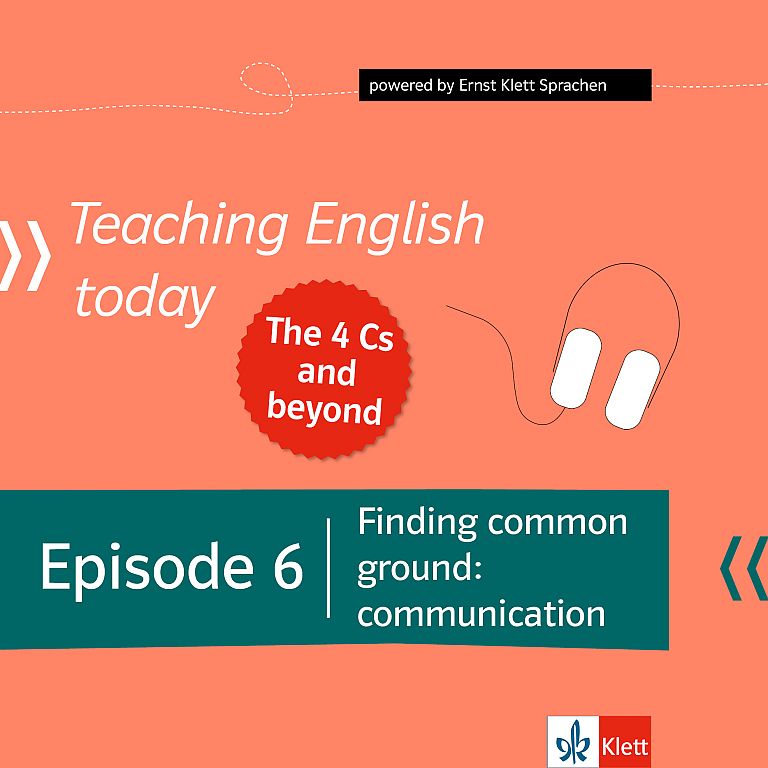
Episode 6
Today, we are used to communicating across a range of media on a regular basis. But this does not mean that it's something we do well. Join me to find out what happens to our brains when we communicate, which factors hinder effective communication and what this means for the English classroom.
Here are the sources for Episode 6.
Online resource: "Universal Declaration of Human Rights". Last accessed 6.7.2021.
Article: Epley, N. & Schroeder, J. "The surprising benefits of talking to strangers". BBC website, 12 June 2019. Last accessed 6.7.2021.
Online resource: Goo, Sara "The skills Americans say kids need to succeed in life." Pew Research Center, 19 February 2015. Last accessed 6.7.2021.
Online resource: World Economic Forum, "Future of Jobs Report 2020." Last accessed 6.7.2021.
TED talk: Hasson, Uri. "This is your brain on communication." TED, February 2016. Last accessed 6.7.2021.
TED talk: Stevenson, Bryan. "We need to talk about an injustice." TED, March 2012. Last accessed 6.7.2021.
Book: Gallo, Carmine. Talk Like TED. The 9 Public Speaking Secrets of the World's Top Minds. London: Pan Books, 2017.
Book: Lindbergh, Anne Morrow. Gift from the Sea. London: Chatto & Windus, 2015.
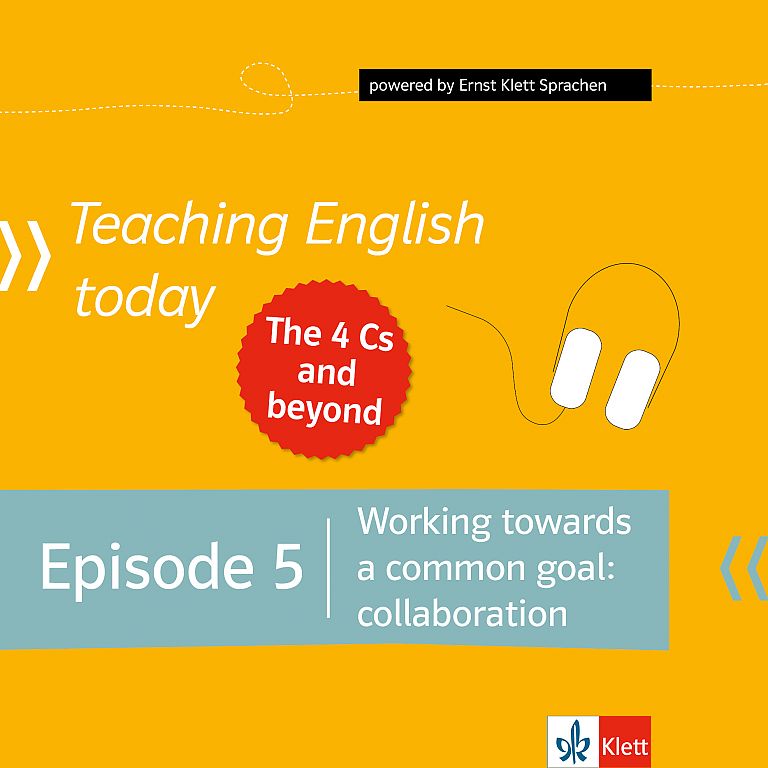
Episode 5
Collaboration is about the process of working together towards a common goal, and it's essential in today's world. But working well in a team and having a shared mindset do not necessarily come naturally to us. This is because effective collaboration requires a range of qualities and skills. The good news is that students can already begin to hone them in the classroom. Listen in to find out more!
Here are the sources for Episode 5.
Online resource: "Manifesto for Agile Software Development". Published 2001. Last accessed 8.6.2021.
Article: Hackman, Richard J. "What makes for a great team?"Psychological Science Agenda, June 2004. Last accessed 8.6.2021.
Article: Haas, Martine & Mortensen, Mike. "The Secrets of Great Teamwork" Harvard Business Review Magazine, June 2016. Last accessed 8.6.2021.
Book: Lencioni, Patrick, The Five Dysfunctions of Teams. San Francisco: Jossey-Bass, 2002.
Article: Kuhn, Deanna. "Thinking Together and Alone." Educational Researcher 10, no. 44/1 (2015). Last accessed 8.6.2021.
TED talk: Treasure, Julian. "5 Ways to Listen Better." TEDGlobal, July 2011. Last accessed 8.6.2021.
Book: Murphy, Kate. You're not Listening. What You're Missing and Why it Matters. New York: Celadon Books, 2019.
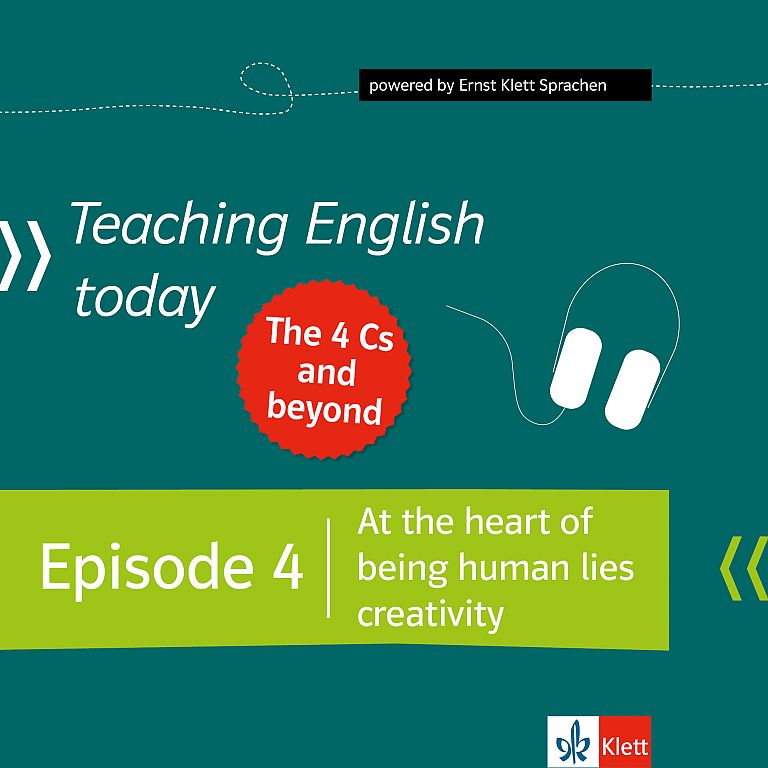
Episode 4
Creativity is central to who we are as humans. It's not only essential for our personal and social wellbeing but is also a skill that is in great demand. Come and join me as we look at different levels and kinds of creativity, ways we can cultivate it (yes, everyone is creative!) and what we can do to foster it in schools and the English classroom!
Here are the sources for Episode 4.
Report: World Economic Forum. "The Future of Jobs Report 2020." Last accessed 12.5.2021.
Article: Lee, Kai-Fu. "Artificial Intelligence Is Powerful—And Misunderstood. Here's How We Can Protect Workers."Time Magazine, 11 January 2019. Last accessed 12.5.2021.
Article: GPT-3. "A robot wrote this entire article. Are you scared yet, human?"The Guardian. 8 September 2020. Last accessed 12.5.2021.
Online resource: Fancourt D, Garnett C, Spiro N, West R, Müllensiefen D. "How do artistic creative activities regulate our emotions? Validation of the Emotion Regulation Strategies for Artistic Creative Activities Scale (ERS-ACA)" PLoS ONE 14(2). Last accessed 12.5.2021.
TED talk: Robinson, Ken. "Do schools kill creativity?" TED, February 2006. Last accessed 12.5.2021.
Article: Torrance, E. Paul and Shaughnessy, Michael F. "An Interview with E. Paul Torrance: About Creativity." Educational Psychology Review 10, no. 4 (1998). Last accessed 12.5.2021.
Article: Kaufman, J. C. & Beghetto, R. A. (2009). "Beyond Big and Little: The Four C Model of Creativity" Review of General Psychology, 13(1), 1–12. Last accessed 12.5.2021.
Report: Organization for Economic Co-operation and Development (OECD). "Fostering Students' Creativity and Critical Thinking." Last accessed 12.5.2021.
Article: Robinson, Ken. "To encourage creativity, Mr Gove, you must first understand what it is." The Guardian, 17 May 2013. Last accessed 12.5.2021.
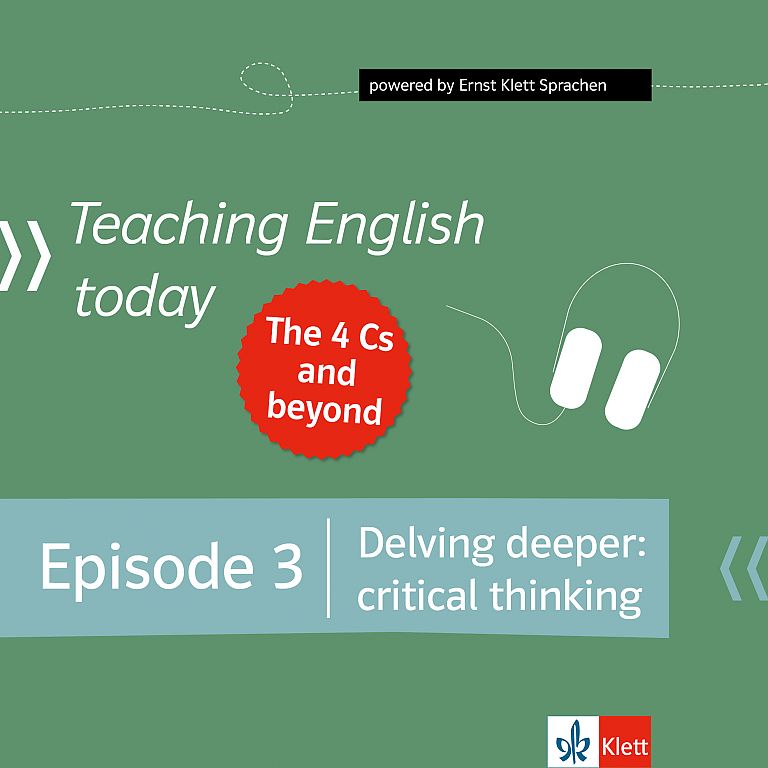
Episode 3
Critical thinking is one of the most in-demand skills for the workplace today. But what does it actually entail, and how can we train ourselves to become better at it? In this episode, I'll also be talking to the English teacher Jürgen Thamerus to find out how he hones his students' critical thinking skills in the classroom. So why not come and join us?
Here are the sources for Episode 3.
Online resource: Ennis, Robert. "The Nature of Critical Thinking: An Outline of Critical Thinking Dispositions and Abilities." Last revised May, 2021. Last accessed 7.4.2021.
Online resource: Hitchcock, David. "Critical Thinking", Stanford Encyclopedia of Philosophy (Fall 2020 Edition), Edward N. Zalta (ed.). Last accessed 7.4.2021.
Report: World Economic Forum. "The Future of Jobs Report 2020." Last accessed 7.4.2021.
Article: Plummer, Matt. "A Short Guide to Building Your Team's Critical Thinking Skills." Harvard Business Review, 11 October 2019. Last accessed 7.4.2021.
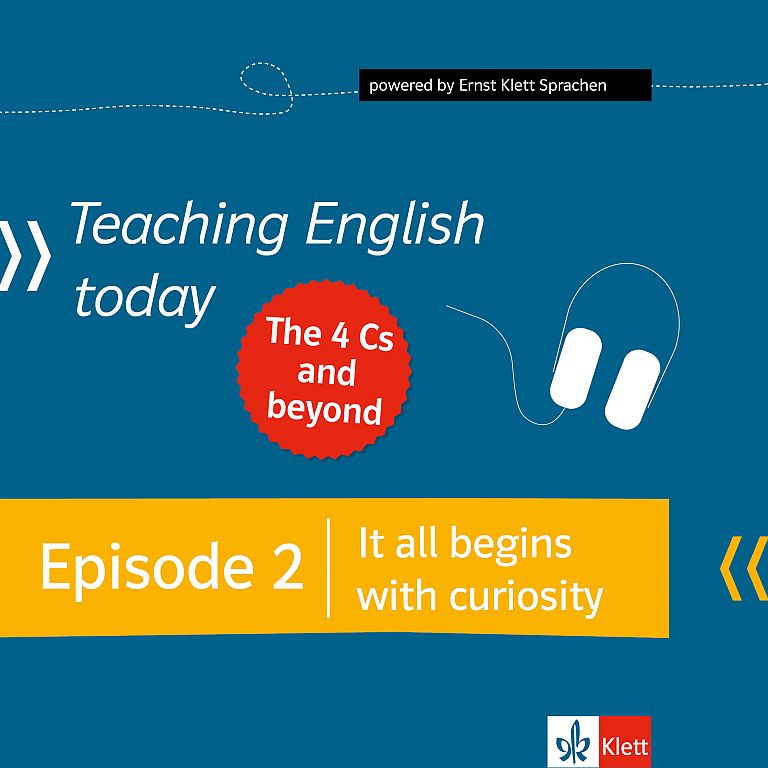
Episode 2
As humans, we are driven by curiosity, the urge to answer the question why. But why is this? What does research tell us about its importance for learning? What can we do to create an environment that fosters curiosity? And what are some of the consequences for teaching English? Come and join me to find out more!
Here are the sources for Episode 2.
Website: Mario Livio. Last accessed 10.8.2024.
Book: Livio, Mario. Why? What Makes Us Curious. New York: Simon & Schuster, 2017.
Article: Grossnickle, E.M. "Disentangling Curiosity." Educational Psychology Review 28/1 (3/2016).
Article: Kang M. J., Ming Hsu, I., Camerer C. F., et al. "The Wick in the Candle of Learning." Psychological Science 20/8 (2009).
Article: Gruber, M. J., Gelman, B. D., Ranganath, C. "States of Curiosity Modulate Hippocampus-Dependent Learning via the Dopaminergic Circuit." Neuron (2014). Last accessed 21.3.2021.
TED talk: Gruber, M. "This is your brain on curiosity." TEDx salon event at UC Davis, 11 November 2015. Last accessed 21.3.2021.
Online resource: Organization for Economic Co-operation and Development (OECD). "Skills for 2030. In brief." Last accessed 21.3.2021.
Article: Lowry, N., & Johnson, D. W. "Effects of controversy on epistemic curiosity, achievement, and attitudes." Journal of Social Psychology, 115/1 (1981). Last accessed 21.3.2021.
Article: Deardorff, D. K. "Intercultural Competence Model" in "The Identification and Assessment of Intercultural Competence as a Student Outcome of Internationalization at Institutions of Higher Education in the United States." Journal of Studies in International Education 10 (Fall/2006).
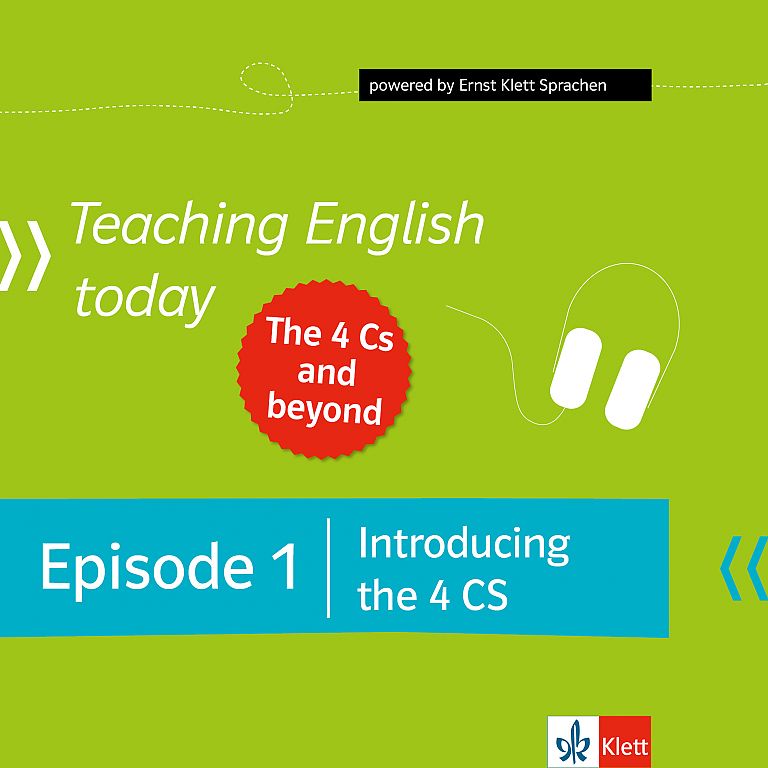
Episode 1
Who came up with the idea for the 4 Cs? Why are they so important for today's students? Which other skills and qualities will they need? And how does this all inform English teaching today? Come and join me as we explore the answers in this inaugural podcast in the series Learning English Today – the 4 Cs and beyond!
Here are the sources for Episode 1.
Online resource: Schleicher, A. "The Case for 21st century learning." Last accessed 21.3.2021.
Website: Sir Ken Robinson. Last accessed 21.3.2021.
Book: Robinson, Ken. Creative Schools: the Grassroots Revolution That's Transforming Education. New York: Penguin Books, 2015.
Website: Angela Duckworth. Last accessed 21.3.2021.
Book: Duckworth, Angela. Grit: Why Passion and Resilience are the Secrets to Success. London: Vermilion, 2017.
